 This site uses cookies in order to function as expected. By continuing, you are agreeing to our cookie policy.
This site uses cookies in order to function as expected. By continuing, you are agreeing to our cookie policy.
Agree and close
 This site uses cookies in order to function as expected. By continuing, you are agreeing to our cookie policy.
This site uses cookies in order to function as expected. By continuing, you are agreeing to our cookie policy.
Agree and close
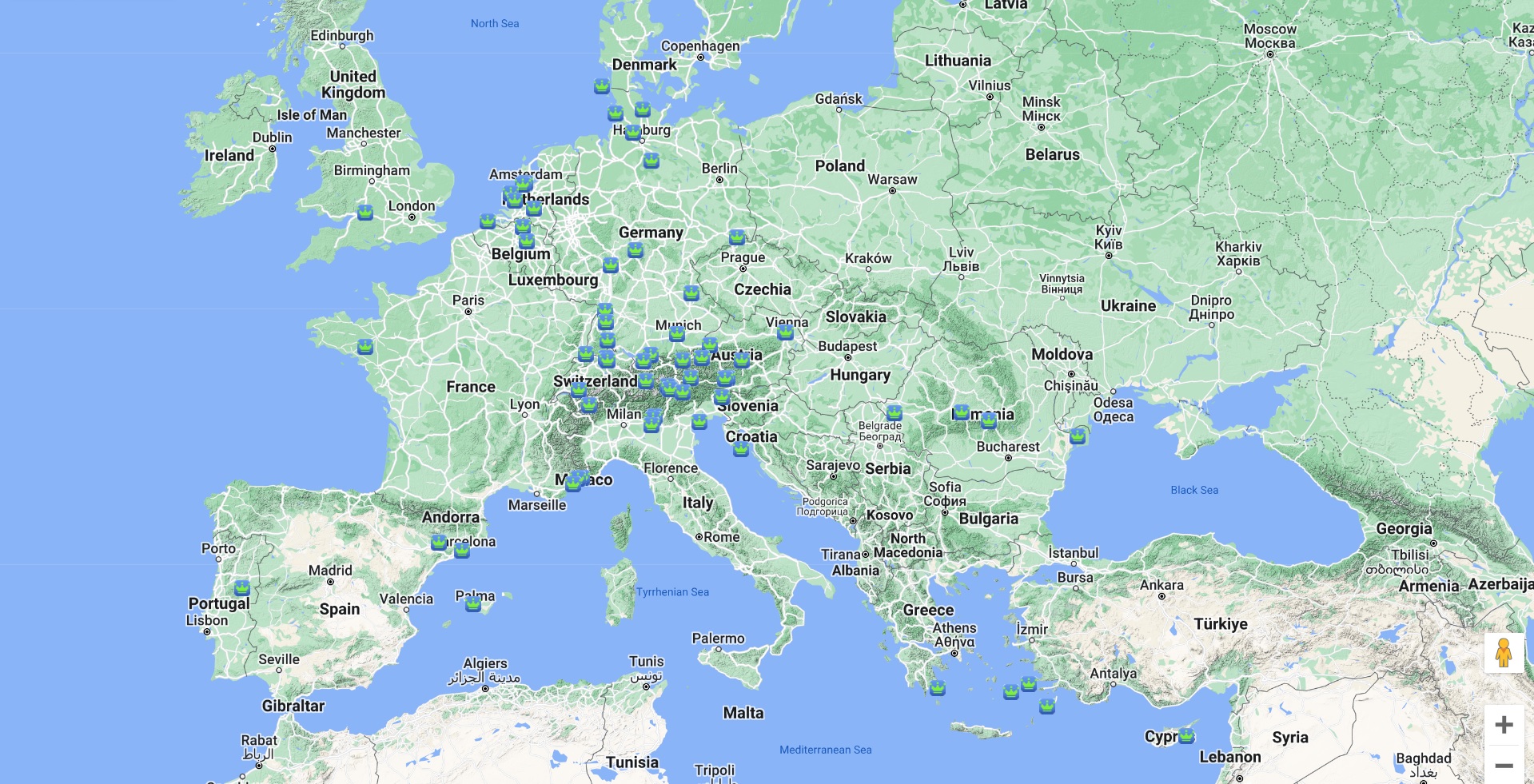
This SME Sustainability Good Practice Collection brings together a set of tourism enterprises in Europe which demonstrate sound management and innovation in the pursuit of sustainability. The collection is based on nominations submitted in 2021 by sustainable tourism certification bodies, following an invitation by the ETGG2030 project partner ECOTRANS. The nominations received were subsequently assessed by a panel of experts participating in the ECOTRANS network.
The collection is presented as a set of good practice case studies, based on the information submitted. These include 36 written descriptions (10 full page and 26 shorter pieces) and a further 34 tumbnail descriptions.
The 36 examples with more detailed written descriptions of their outstanding contributions to the SDGs are marked with ** (10 longer case studies) and * (26 shorter case studies).
The 70 enterprises are primarily accommodation businesses, including hotels, other serviced accommodation, self-catering/apartments, glamping and camping operations. A small number of other types of business are also featured, including tour operators, attractions, activity providers and restaurants.
You can read the good practice descriptions for each of the 70 examples below. They are taken from the ETGG2030 Good Practice Collection Dossier that is available for download on this page. Therein, you can find the descriptions again but you will also find the certification scheme, category and website details relevant to all 70 collected examples.
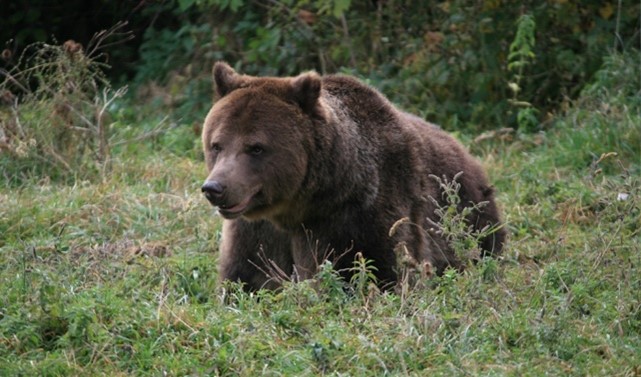 ABSOLUTE CARPATHIAN
ABSOLUTE CARPATHIANAbsolute Carpathian is an incoming tour operator specialising in the provision of wildlife watching experiences in Romania, with a focus on wolf, bear, lynx and bird watching. Programmes range from day visits of just three hours to short breaks and 10-day programmes. The company’s Responsible Tourism Policy, shown on the home page of their website, covers economic, environmental and social sustainability. The company only uses locally provided services and it favours the use of local crafts and produce. Group sizes are kept very small, to minimise negative impact. Itineraries are planned to minimise distances between accommodation and wildlife watching sites. All the accommodation used by the company, including its own operation, has been certified by Eco Romania.
A key element of their approach is to create a positive link between tourism and wildlife. The company clearly states it aim to share wildlife experiences with clients and help them understand the importance of conservation, using ecotourism to help protect large carnivores in their natural habitat. The company has a partnership with the Romanian Wildlife Research Institute and the researchers guide the clients. It is underlined that these activities do not harm the animals and do not put visitors at risk, as the researchers know the best way to approach the animals and the watching is done at a safe distance. Some of the data collected during the tours are used by the Institute as part of their research on wildlife behaviour, including the sensitivity of bears towards humans. The data are also used in advocacy for improving legislation.
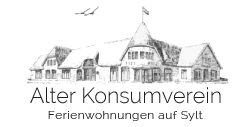 ALTER KONSUMVEREIN
ALTER KONSUMVEREINApartments provided in an old house, carefully restored to create a symbiosis between historical architecture and modern comfort. It is managed in a sustainable way and seeks to benefit the economy of the island of Sylt.
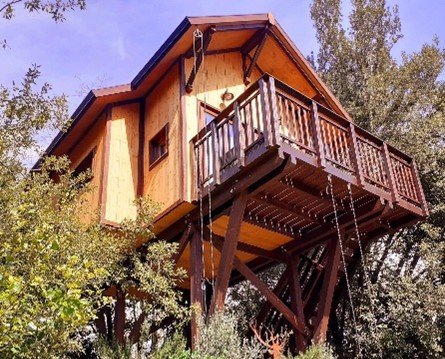 AWEN TREE HOUSE *
AWEN TREE HOUSE *The Awen Tree House provides self-catering accommodation in a special building constructed within a grove of holm oak trees. The ethos presented to the guests is one of escaping to nature, with the opportunity to sleep in a tree and get away from intrusive technology. Certification by Biosphere is used to back this up. All waste is separated and wastewater is filtered and recycled. The operators inform customers about wildlife and nature in the territory and provide bikes to explore nearby natural areas. They collaborate actively with WWF to combat illegal fishing and poaching.
The Tree House is built from FSC wood using green building techniques and has thermo-acoustic insulation in hemp fibre. This natural material is refractory to mould and insects ensuring healthier environments. It is fire resistant, light, totally recyclable and biodegradable. It is also a carbon negative material that synthesizes carbon by reducing CO2 and other polluting emissions into the atmosphere. Hemp is also an anti-seismic material and avoids the extensive use of water found in traditional materials such as concrete.
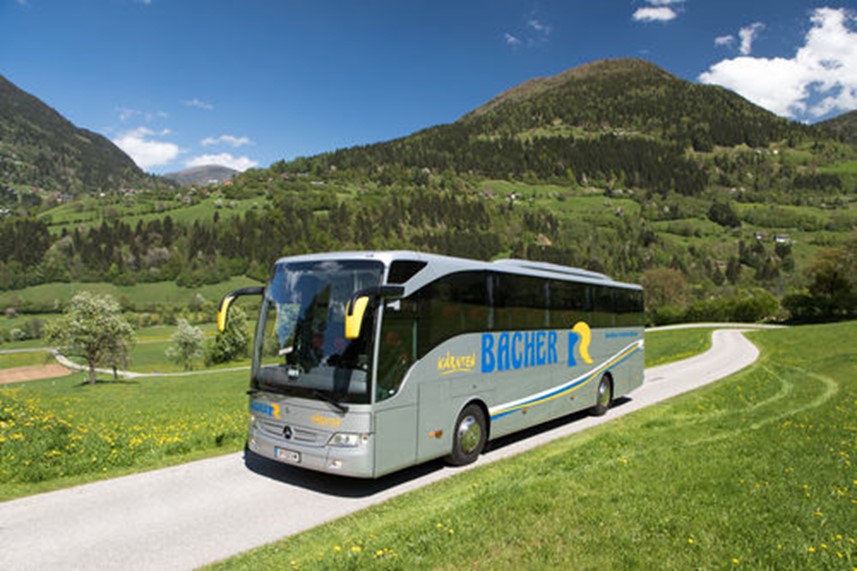 BACHER TOURISTIK *
BACHER TOURISTIK *Bacher Touristik is a travel agent, excursion and group tour operator and a bus company with 45 vehicles. It promotes an environmental policy and publishes a handbook on operational environmental management. The company is ISO 14001 certified for its environmental management system, within the area of passenger transport and travel. In 2020 Bacher was awarded the Austrian Ecolabel.
The company has pursued various initiatives to provide and promote more sustainable travel. The company has invested in EURO 6 buses, which are more environmentally efficient, with significantly lower NOk emissions . Climate Neutral trips can be purchased, with integral compensation of emissions. Travel offers to national parks in Austria and Slovenia, including accommodation, sustainable activities and local guides, have been certified with the Austrian Ecolabel. “Class Travel for a Healthy Climate” is a specific programme of school trips which combine transport using EURO 6 buses, visits and experiences related to sustainability themes and education, and the use of certified accommodation. Bacher has also been a winner of a European award for environmentally friendly bus driving practices. Telematics systems are used to watch CO2 emissions while driving.
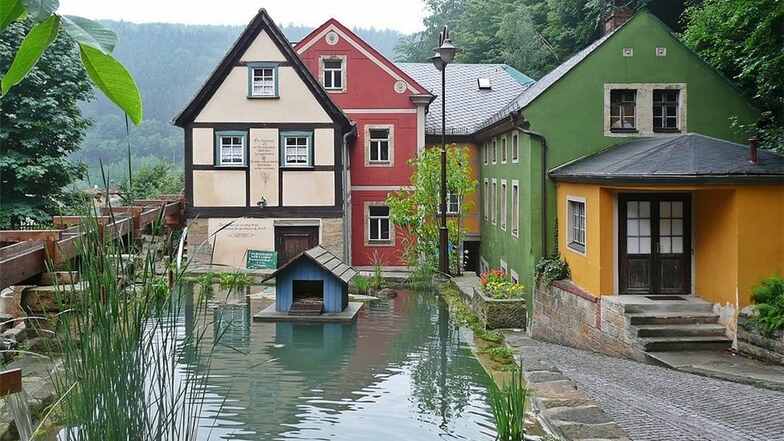 BIO & NATIONALPARK REFUGIUM SCHMILKA
BIO & NATIONALPARK REFUGIUM SCHMILKAA village containing accommodation houses on the edge of Sächsische Schweiz National Park. Most houses are ecologically renovated, using regional materials and craftsmen. Energy is from renewable sources. Activity offers are provided in partnership with the national park, with information on sustainable use.
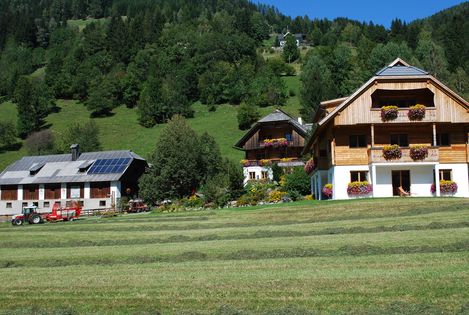 BIOHOF SEIDL
BIOHOF SEIDLA small accommodation enterprise based in a house built and furnished to strict environmental criteria. All the electricity is from renewable sources. Food includes produce from their own organic farm.
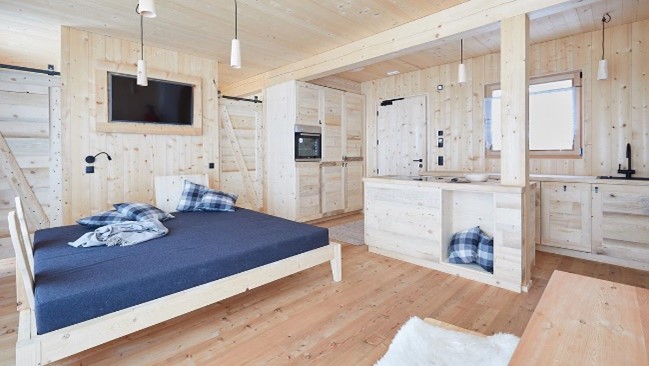 BLASLA HOF *
BLASLA HOF *The Blasla Hof offers apartments and chalets, a cave swimming pool, sauna and hay bath, with a central stube providing a buffet breakfast and some evening meals. There are opportunities for communal cooking and learning with the hosts to make local specialities such as knödel dumplings. The Bio Hotels certification requires comprehensive management of resources and CO2. The business is climate neutral, with 100% green electricity. Products used are organic and locally sourced.
The enterprise has tried to maintain traditional practices in construction and furnishings. Natural materials are used, such as wooden floors and furniture, walls of stone and fragrant Zirmholz wood, and the use of sheep wool and hay in insulation, fabrics, beds and pillows. Items are handmade and based on genuine South Tyrolean craftwork. The purchasing of produce (eggs, milk, cereals, bread, honey, bacon, sausage, vegetables, cheese, herbs, juice and wine) from a wide range of local farmers, strengthens the regional economy.
 BOUTIQUEHOTEL STADTHALLE **
BOUTIQUEHOTEL STADTHALLE **The Boutiquehotel Stadthalle is a 79 bedroom hotel located near the centre of Vienna. Care for the environment dominates the hotel’s management ethos and its public facing image under the brand message ‘Green at Heart’. The website states that “There’s only one thing closer to our hearts than our guests: our environment!” This is backed up by more detailed communication, including on how the hotel relates to each of the 17 SDGs. The hotel is certified by the Austrian Ecolabel and has also received various top environmental awards at a national and European level.
Boutiquehotel Stadhalle is the first zero-energy balance hotel in Europe. Energy consumption has been reduced so that it can all be met through the hotel’s own groundwater heatpump, photovoltaic technology and solar panels. Just by relinquishing the use of minibars the hotel was able to save 21,024 kg of CO2 per year. The hotel supports the use of energy efficient transport, providing discounts for arrivals by bike and train and promoting use of the city’s cycleways.
Purchase of food and other supplies is carefully managed. All produce used for breakfast is 100% organic. Local suppliers are used wherever possible and the use of transport from more distant sources is monitored – for example, coffee reaches them by sail. Use of fish has been reduced and related to management of marine ecosystems. All cleaning products are microplastic free. The hotel adheres to the concept of the International Zero Waste movement and materials used follow the cradle-to-cradle principle. Innovative and creative re-use of items is a feature of the hotel’s furnishings and design. Eco-shower heads and flow limiters have reduced water consumption by up to 35%.
As a city centre hotel, the Stadthalle has limited grounds. However, green foliage is a strong feature of the hotel. The courtyard walls are completely covered in ivy. A lavender roof provides a habitat for bees and a source for producing honey, other dishes, and scent bags for use in the closets.
People-centred quality management involves precisely defined processes that not only make work easier but improve collective performance. Service quality, work efficiency and stress-free conditions are the result. The hotel has also established various external partnerships. Together with national and local bodies and other hotels and suppliers, it launched a project in 2017 dedicated to reducing waste in the hotel industry.
 CAMPING BALDARIN *
CAMPING BALDARIN *Camping Baldarin is a sizeable camping site providing pitches for tents, mobile homes and caravans as well as established glamping units and a range of facilities. It is also a naturist site. Baldarin was awarded Croatia’s Campsite 2018-2020. It is actively involved in sustainability management and has been certified for its Environmental Management System under ISO 14001. The campsite has been monitoring its resource consumption and carbon footprint since 2005, in common with over 200 other sites across Europe which are recognised by Ecocamping, whose aim is to promote sustainable development, environmental protection, safety and quality in the camping sector.
Baldarin shows commitment to marine conservation through comprehensive wastewater treatment, recycling and the composting of solids. It provides education on the extinction of species and organises litter collection events with guests at the ocean. Site design and management is aimed at preserving biodiversity. The site includes a herb garden, wildflower meadow and nesting boxes for birds. Old species of trees are preserved and reforestation uses native and insect-friendly species.
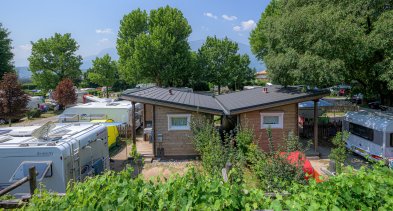 CAMPING MOOSBAUER
CAMPING MOOSBAUERSmall 100% carbon neutral camping site with restaurant offering holistic regional cooking. Natural environment with ‘urban gardening lounge’, fruit trees and honey making. The LernCamping concept provides education for guests on sustainability and local heritage.
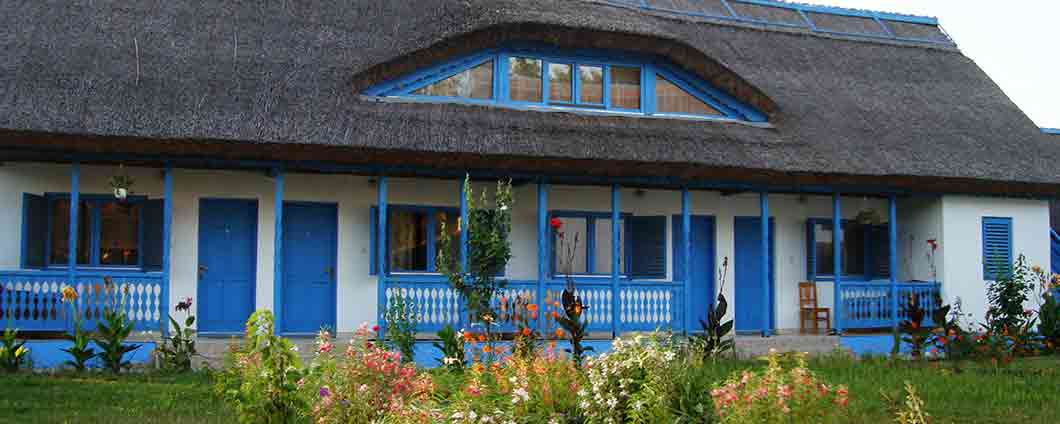 CASA DINTRE SĂLCII
CASA DINTRE SĂLCIIGuesthouse in the Danube Delta Biosphere Reserve pursuing sustainability: solar panels, own wastewater treatment plant and water management. Waste is carried to the mainland by the owner under contract with the municipality and is separated five ways.
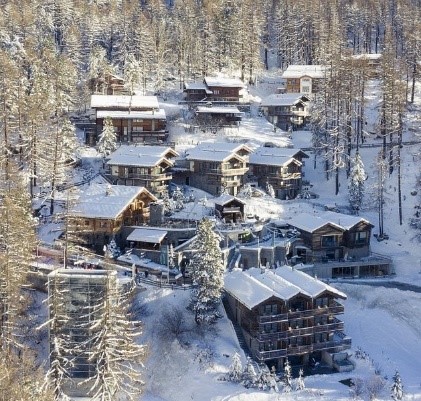 CERVO MOUNTAIN RESORT **
CERVO MOUNTAIN RESORT **The CERVO Mountain Resort has 54 luxury bedrooms in seven lodges, three restaurants and a spa and resort facilities. It is located in the famous tourist centre of Zermatt, within sight of the Matterhorn. The description of the business underlines the opportunities for guests to explore the impressive nature surrounding the resort and to discover themselves, while also promoting interaction with staff and locals and contributing to shaping the Zermatt community in its culture, tradition and values. The CERVO has been granted gold recognition in the Ibex fairstay label. It has also received MyClimate Foundation’s 2021 Award as a pioneer of sustainable hotel business locally and globally.
Energy is sourced and stored via five geothermal probes. The heat pump is powered by solar energy. Waste heat is reused through efficient water heating and consolidation of the hotel’s channel system. Waste heat from commercial refrigeration is used for producing hot water. In some lodges intelligent technology measures air pollution and automatically ventilates the space when needed. Water saving devices are used throughout. Water is sourced directly from the glacier and purified by an osmosis water filter.
Guests are invited to offset their CO2 emissions during their stay, with CERVO doubling this contribution. Management guidelines reduce emissions related to food and beverage. 65% of dishes offered are vegan or vegetarian, with all meat dishes subject to the payment of an additional CO2 compensation fee. This is now also applied to the house beer. Zermatt is a car-free destination and the resort promotes arrival by train.
The land surrounding the resort is managed as permaculture and provides a source of some foods. Herbs and vegetables are grown in the gardens, which has perennial and berry hedges. The resort has its own bee colony and uses natural pest control methods. Local organic produce is used where possible, also working with other selected producers who have a proven track record of sustainability.
The resort has a fair employment policy and culture, based on a holistic approach. Mindful living and sustainable practices are passed on to employees every day. While all staff live locally, there is a wide diversity of origin as well as a gender balance, with 50% of management being female. There are strong links with the Zermatt community, centred on the relationship with local farmers and producers and the use of local construction services and materials. The sustainability ethos is demonstrated by projects such as a monthly soup table, a vegetable market and an annual sustainability day to raise awareness amongst employees and local people.
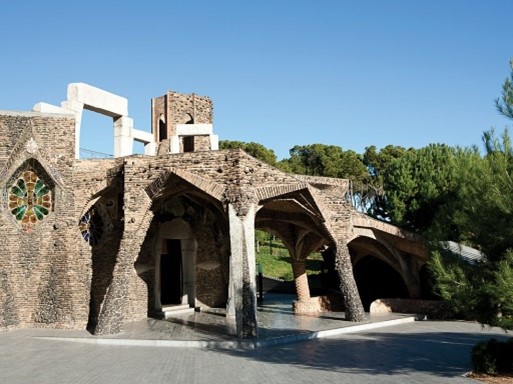 COLÒNIA GÜELL **
COLÒNIA GÜELL **The Colònia Güell crypt is an ecclesiastical building by Gaudi on the outskirts of Barcelona. It is of major architectural interest and was declared a UNESCO World Heritage Site in 2005. It is a significant visitor attraction but less well known and frequented than the major Gaudi sites in the centre of the city. Sustainability is seen as an integral part of the management of Colònia Güell as a cultural tourism facility.
Particular attention is paid to recycling and waste management. This is put across to all employees in their welcome pack and training. Local companies and craft producers are prioritised in sourcing services and gifts to sell in the shop. The management body has started to measure the carbon footprint of its activity, to guide the minimization of emissions. Use of rail to access the site is favoured and a combined ticket has been created for an audio-guided visit to Colònia Güell and transport from central Barcelona, through agreement with the public transport company. Event organisers using the site are informed about how to measure and minimize their carbon footprint. Noise levels are kept to a minimum, helped by restricting guiding to small groups and not using loudspeakers.
Many of the personnel working at Colònia Güell are part time or studying. This is supported through allowing flexibility in work schedules. These schedules are agreed with the individuals concerned and then made known to all staff through a circular, thereby ensuring transparency.
A strong relationship has been built with the surrounding area. Colònia Güell is an active member of the Tourism Consortium of Baix Llobregat and participates in its sustainability training and other activities. It provides information to visitors on how to behave in the nearby natural area of the Llobregat Delta. It hosts a local cultural festival and works with schoolchildren on education projects such as a mosaic workshop.
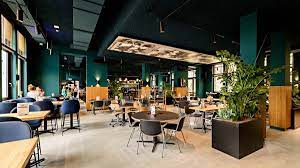 CONSCIOUS HOTELS
CONSCIOUS HOTELSCompany providing four sustainable hotels in green locations in Amsterdam, actively promoted for their ecological approach. In addition to their own waste, water and carbon management, they use sustainable providers of energy, laundry and other services.
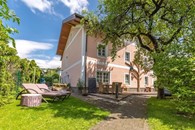 DAS GRÜNE HOTEL ZUR POST *
DAS GRÜNE HOTEL ZUR POST *The Grüne Hotel zur Post is a family run business in Salzburg, which seeks to combine a warm welcome with environmentally friendly hotel management. The first move to make the hotel more sustainable was to install photovoltaic panels in the roof. These deliver up to 11,000 kWh per year. The remaining electricity is obtained from Salzburg AG, which supplies pure green energy from renewable sources. In 2014, the oil heater was replaced with a pellet heater, using sustainable wood pellets. Replacement of old taps has reduced water consumption in washand basins from 15.2 litres to 7.2 litres per minute, with a similar reduction in showers from 14 litres to 9 litres, without any loss of quality. Total savings of 775 m3 of water and 30,000 kWh for water heating have led to a CO2 saving of 8,500 kg. Guests travelling by electric car, bicycle or train are given a discount on the hotel room rate. A charging station is available for electric cars and e-bikes.
Considerable attention is paid to the use of environmentally friendly materials. Simple steps are also taken to reduce packaging, such as sourcing cleaning agents as concentrates in 10 litre canisters, which are then mixed with water for use by the hotel. Towels and bathmats are made from organic cotton, manufactured without the use of toxic and synthetic substances. A published CSR Report sets out other aspects of sustainability management, including relationship with employees and the local community.
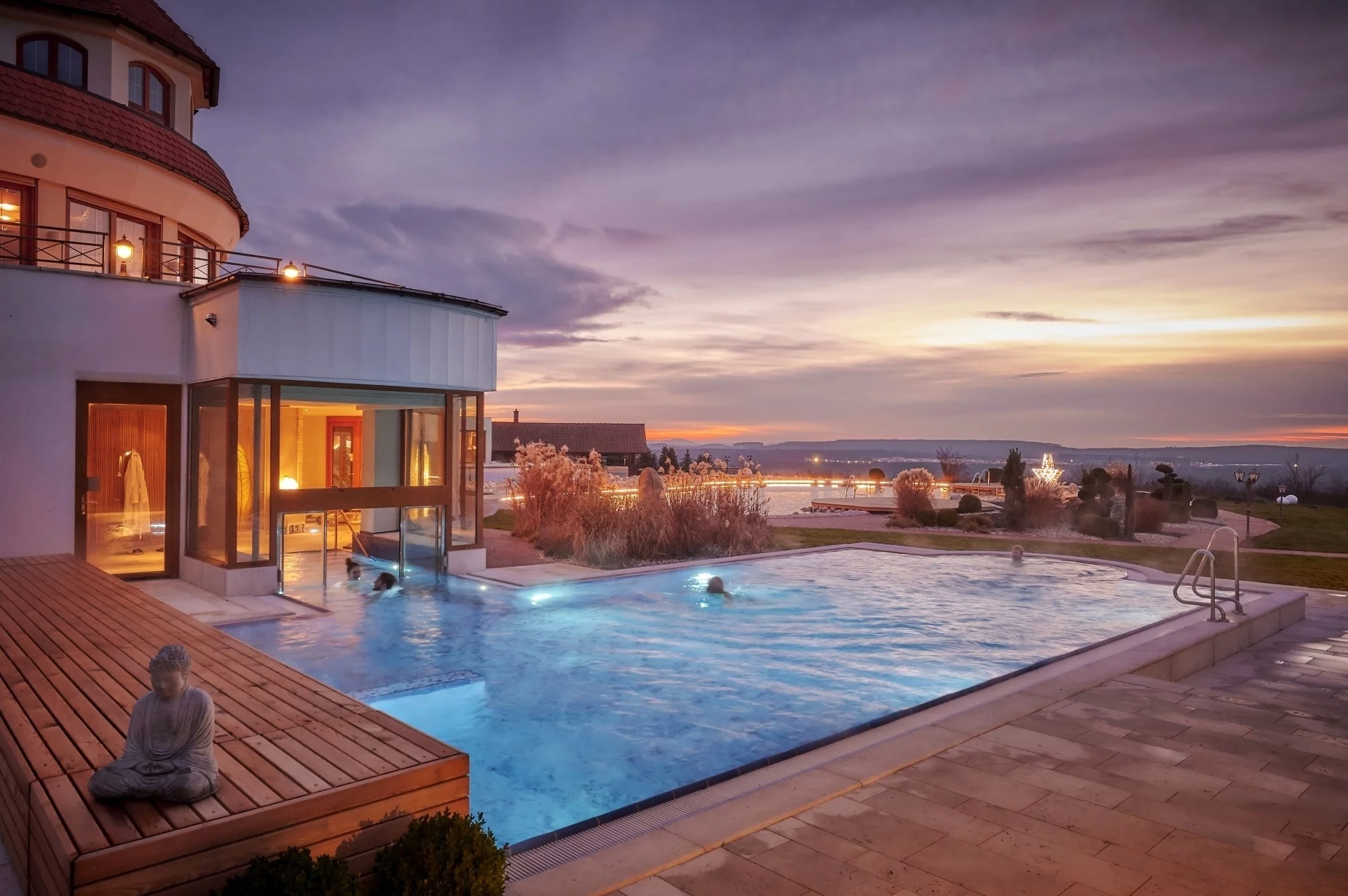 DER BIRKENHOF
DER BIRKENHOFHigh quality hotel and Michelin stared restaurant, reducing emissions through photovoltaics and heat/power units, using local and certified produce and conserving flower meadows in the surroundings.
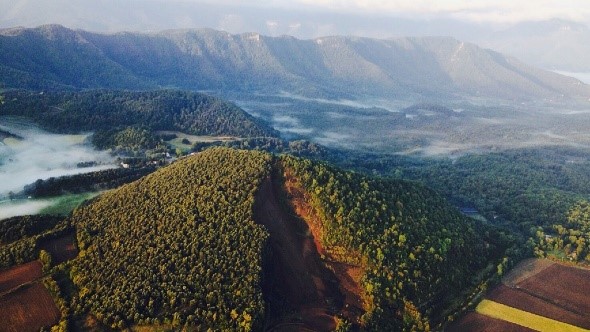 ECORETREAT *
ECORETREAT *Ecoretreat is an activity and tour operator which provides eco-retreats for employees of companies of all sizes. Their approach is to offer a tailor-made experience to assure that participants will feel a deep connection with nature to recharge their batteries. They provide full travel packages, from transportation to eco-accommodation, bird-watching, collecting mushrooms in the woods or cleaning the beaches of Costa Brava. In response to an increase in stress levels and hybrid-working, they seek to restore a sense of purpose and enable people to give something back to nature.
The company has set objectives for reducing CO2 emissions and a monitoring plan has been developed. They also take action against plastics and waste. All their programmes take place within Catalonia and they have established many local partnerships, as well as seeking to provide opportunities for young professionals. Suppliers, such as accommodation providers, activity operators and guides, have to demonstrate a commitment to sustainability, assessed through a checklist. Clients are provided with information on local nature and how to respect it, such as minimising noise levels.
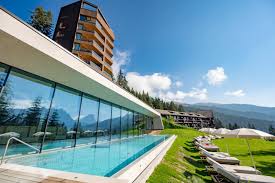 FORESTIS DOLOMITES
FORESTIS DOLOMITESHotel promoted as a place of retreat, with a focus on the mountain and forest location, and their own planting of native species. Programme of energy, waste and water management. The reusable Forestis Foodbox is used to collect food from local farmers and avoid packaging. Guests are given a local transport pass.
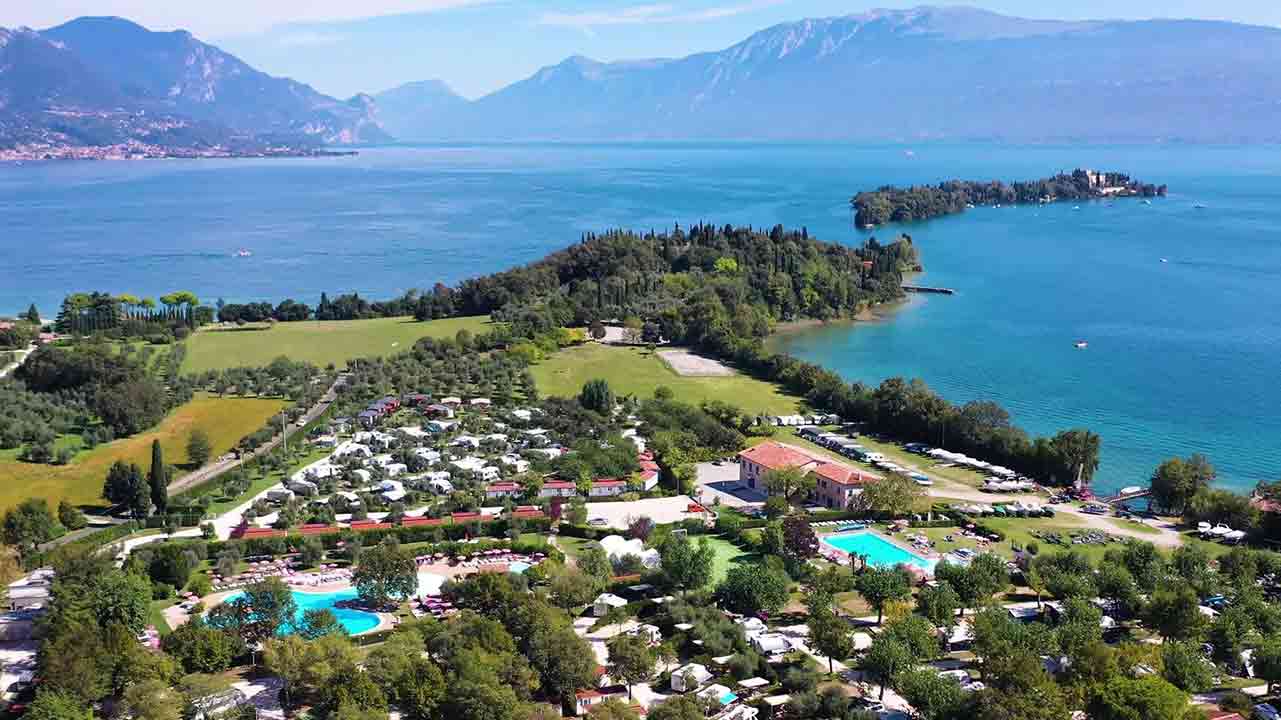 FORNELLA CAMPING
FORNELLA CAMPINGCampsite with 12-point sustainability commitment. The farming and leisure business are integrated. The fruit tree meadows have areas for tents and rows of wine grapes are found between camping pitches.
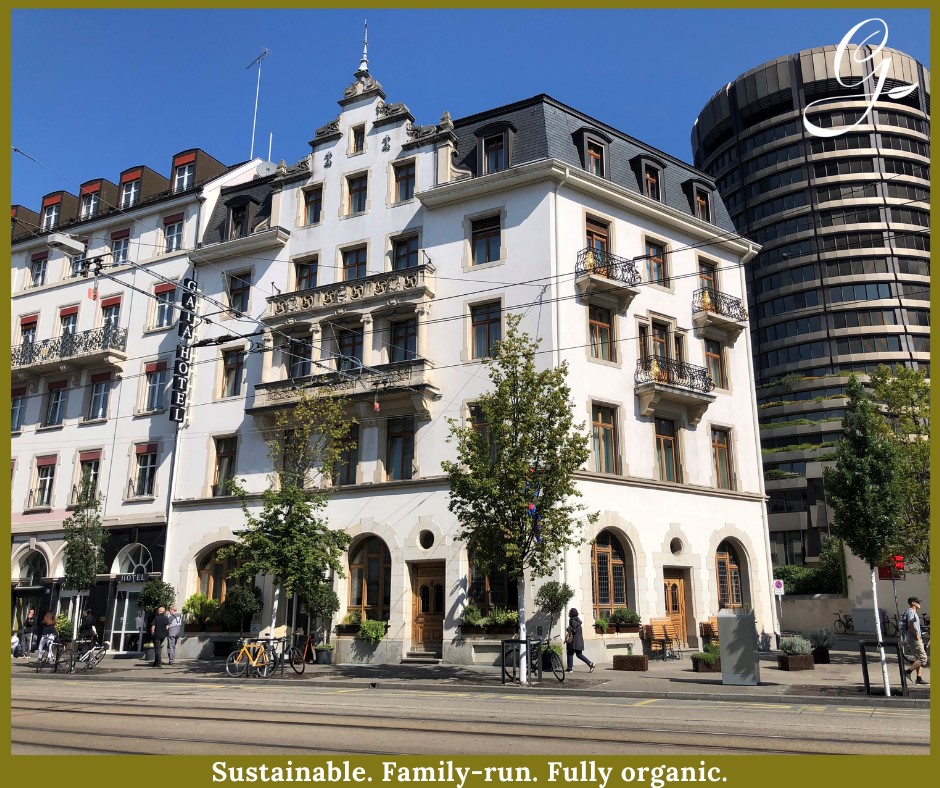 GAIA HOTEL
GAIA HOTELTraditional family hotel run for over 90 years, repositioned in 2015 as a bio hotel, with comprehensive resource management, 100% green electricity, minimal packaging and organic produce. Guests are given the Basel Card, providing free use of public transport.
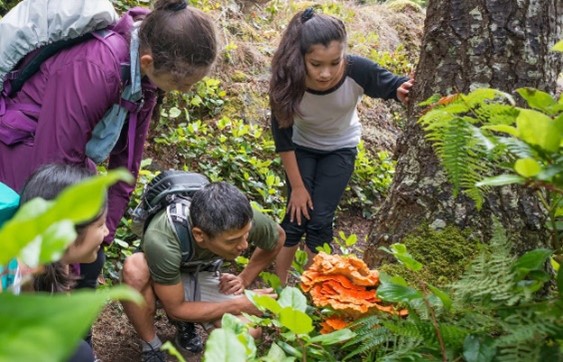 GEBECO *
GEBECO *Gebeco is a tour operator offering programmes in Germany, the rest of Europe and further afield. The commitment to sustainability, with certification by TourCert, is clearly stated on their website. Gebeco has developed a catalogue of sustainability criteria (covering accommodation, departure and arrival, transport, visits, sustainability-related activities, food and group size), which must be met in part or in total by all trips. The criteria are monitored each year and trips that meet all the criteria are marked with a special label.
Gebeco seeks to use accommodation that has been certified by internationally recognised sustainability certification schemes. It also favours accommodation with a close connection to local culture and which uses organic produce. The company takes account of flight-based emissions per overnight stay: where flights are over 800 km the minimum stay is one week (two weeks if over 3,800 km). The Atmosphere Airlines Index is used to select environmentally efficient airlines, compensation of emissions is promoted, train transfers are included in the offer and the use of domestic flights has been reduced. The use of public transport, bicycles and other low carbon travel options is favoured in destinations.
A key aspect of Gebeco’s approach is its relationship with staff, local partners and communities. Social and environmental projects are supported directly and through engagement with other bodies such as Futouris. An example is the wilderness tracker project with the local Khwe community in Namibia. Guests can visit various aid projects during their trips. Every new employee receives a training course on human rights in tourism. Framework agreements with local partners ensure compliance with human rights and other sustainability requirements. Gebeco also works with other tour operators and international bodies to promote fair wages, working conditions and social security in the sector and to outlaw child exploitation.
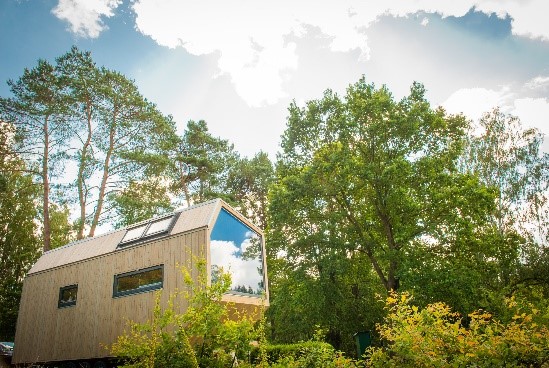 GREEN TINY HOUSES **
GREEN TINY HOUSES **Green Tiny Houses provides purpose-built self-catering units, located at three sites in Germany, two on the North Sea coast and one at the inland lake of Salemer See. The company seeks to promote sustainability not as a label but as an experience, while also considering the health and wellbeing of guests. It makes the most of the flexibility of really small and light units, which can be located within natural settings. There is no compaction of the surfaces on which the units stand.
These mini holiday homes are small, just 22 square metres, but contain many innovative sustainable features. The facades are made of wood which has been impregnated to make them last for 30 years but without the use of heavy metals and organic solvents. The kitchen has a reverse osmosis water filter, to enable high quality water to be accessed from the tap. The bathroom is equipped with a highly efficient shower originally invented by NASA for the space programme, which consumes 90% less water and up to 80% less energy than conventional shower systems. There is an incinerating toilet which does not use water but burns all deposits at high temperature leaving a cup of ash.
Air purification is by a natural plant which converts formaldehyde and other pollutants into nutrients for itself, together with intelligent skylights and automatic ventilation. Hand and shower towels are of wood-based material that is climate and resource positive. All the CO2 emissions that occur are offset through regional climate protection projects.
The properties pay close attention to natural areas around them. Five percent of the rental income is donated to local conservation projects in the nearby nature parks (e.g. Lauenburg lakes). E-bikes are provided for exploration. The sites also contain separate mini sauna buildings, made of sustainable materials similar to the accommodation units. Tiny workspaces have also been provided for guests who are seeking a retreat for quiet working in a natural environment.
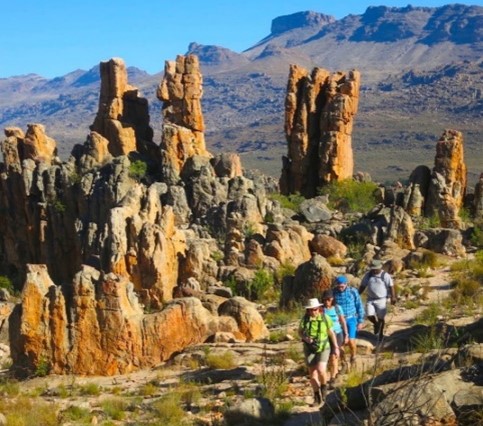 HAUSER EXKURSIONEN **
HAUSER EXKURSIONEN **Hauser Exkursionen is a hiking and trekking tour operator, based in Germany and operating throughout Europe and worldwide. Sustainability has been anchored in its corporate approach since the company was founded in 1973. This is reflected in a five-point manifesto and a slow-trekking philosophy.
Ensuring responsible consumption and production depends heavily on the activities of the businesses who supply services to the tours. Hauser requires that every partner must sign a Supplier Code of Conduct, declaring their responsibilities relating to human rights, working conditions, a fair economy, biodiversity and environmental protection and preference for regional products and family-owned accommodation.
HClimate concern is addressed through a clear policy towards emissions from transportation. Climate sensitive product planning takes account of length of stay and flight distance in considering emissions per night, viz: no flights if under 800km; up to 3,800 km – minimum stay one week; over 3,800 km – minimum stay two weeks. No flights are used within Germany and domestic flights are also avoided elsewhere if possible. Home to airport transfers involve inclusive rail tickets. Within Europe, Hauser has a policy of over-compensation (110%) of flight emissions using Atmosfair (an award-winning science-based scheme). For intercontinental flights, clients are asked to purchase compensation, but this is then doubled by Hauser. The long-term target is to compensate 100% of CO2 emissions by 2025 (60% was achieved in 2021).
The focus on trekking tourism is seen as important, as an activity which supports rural development, addresses depopulation, uses local resources and infrastructure and values nature. Hauser has a strong programme of support for social and environmental projects in the destinations and communities visited. Examples in Nepal include the Climate Trek project (together with Atmosfair and other partners) rebuilding paths and huts to higher environmental standards after the earthquake, and the ‘One Day One Tree’ reforestation project, planting one tree per each client-day of trekking. In a remote region of Peru, Hauser has developed employment opportunities for men and women in and around the lodges visited.
The company seeks a long-lasting partnership with suppliers. Over 80% of the guides used are local. A tour guide education programme helps guides to advance their careers to become professional tour leaders for the whole trip, enhancing both income and self-confidence. Since 2020 virtual trainings have been held for tour guides worldwide. In addition, during the pandemic, local guides and agencies have been enabled to offer ‘virtual tours’, as a source of advertising and training but also of some income.
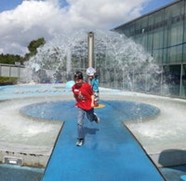 HIDRODOE **
HIDRODOE **Hidrodoe is a science museum and visitor attraction dedicated to water. The central part of Hidrodoe is Waterworld, where visitors can have experiences and perform experiments relating to water. The attraction was founded by its parent company Pidpa, the water supply company of the Antwerp province, in 2003. Hidrodoe is a leading attraction in the sustainability of its operations. It has received certification from Green Key eleven times and is also ISO 14001 certified. Pidpa is a UNITAR SDG Pioneer.
Relating to the theme of the attraction, Hidrodoe takes various actions in water management. Its goals include reducing water use by over 50%; infiltration of all collected rainwater; upcycling of sanitary waste using innovative techniques such as phosphorous removal with iron oxide coated sands; and other measures towards a circular water management. The urinals do not use water.
A climate plan is drawn up, with concrete actions to reduce energy consumption and emissions, supported by a multidisciplinary working group on rational energy management and periodic energy audits. Actions include: use of 100% green energy including own solar panels; digital metering devices; use of glass film insulation; electrical car charging points. A heat pump, using warmth from nearby drinking water cellars at constant temperature, is being installed. Various measures are used to reduce waste, including collection and recycling, and cooperation with food waste reduction schemes. Local and vegan food is offered and Hidrodoe sells its own beer in collaboration with a local brewery.
The surrounding area is quite small, but includes woods and wildflower meadows which are ecologically managed. Varius actions are taken to involve employees and visitors, notably schoolchildren, in environmental activities and education, including: litter cleans (‘plogging’ events – jogging+litter-picking); exhibits/games that demonstrate impact of human activity and behaviour; and strong promotion of the benefits of using tap-water (500 time less carbon footprint than bottled water).
Pidpa is a sustainable employer, promoting non-discriminatory employment and a good work-life balance. It offers various training to staff, including on stress prevention and sustainability. Use of public transport is reimbursed and a bicycle allowance is offered. More widely, partnerships have been established with various local and national tourism, water, community and accessibility bodies. Water projects in developing countries are also supported.
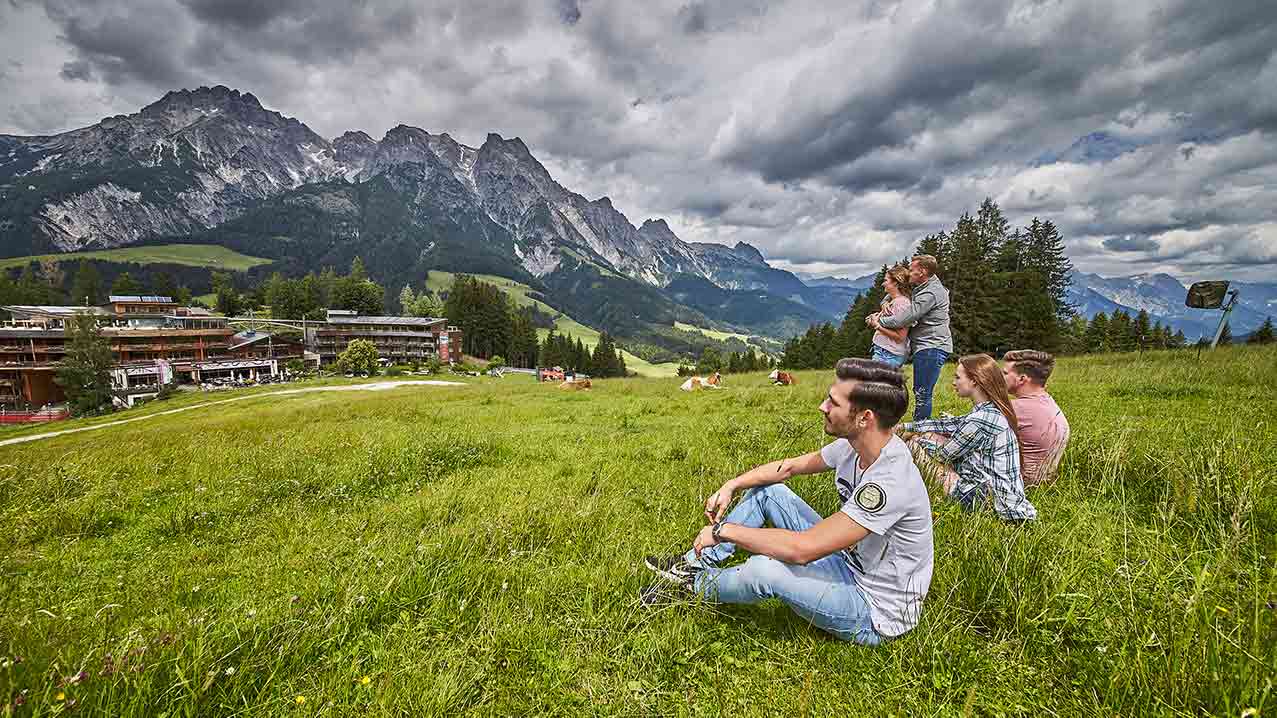 HOLZHOTEL FORSTHOFALM
HOLZHOTEL FORSTHOFALMThe building, made of wood, stone and glass, has a passive construction which has resulted in a 75% energy saving. The hotel uses a new water consumption and waste concept, together with heating from pellets.
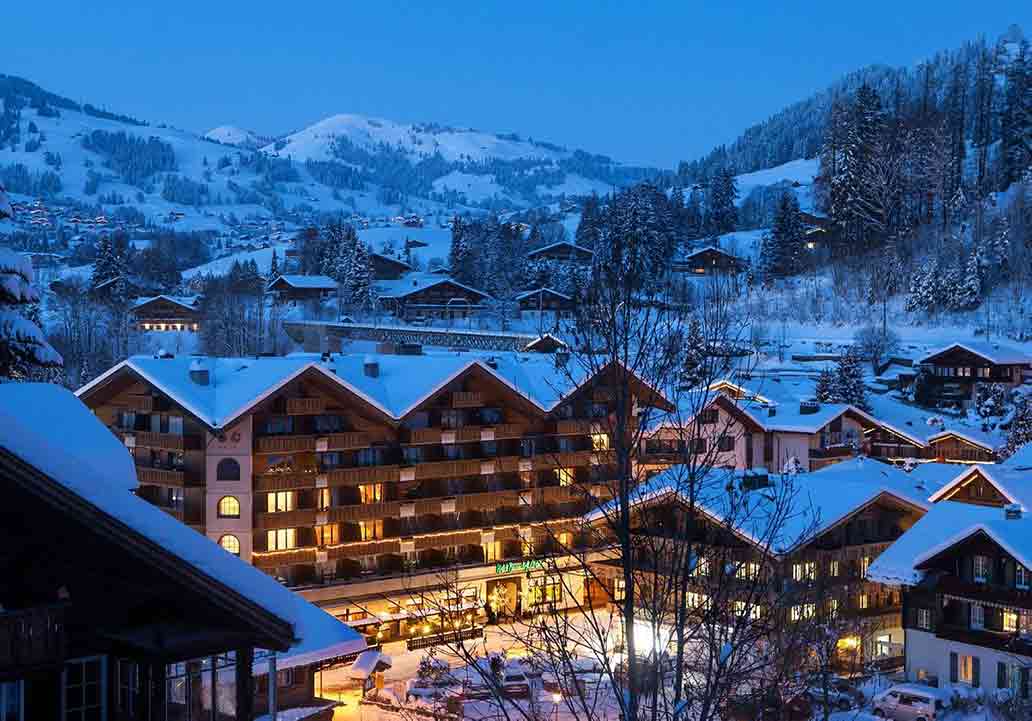 HOTEL BERNERHOF GSTAAD
HOTEL BERNERHOF GSTAADThe hotel has a sustainability concept, promoted to all new employees. It participates in an energy monitoring initiative, resulting in a 7.5% reduction in one year. Food waste has been reduced by 24%. The company works with communities and farms in the surrounding mountain villages. It also founded a network with other businesses in Gstaad to support cultural events.
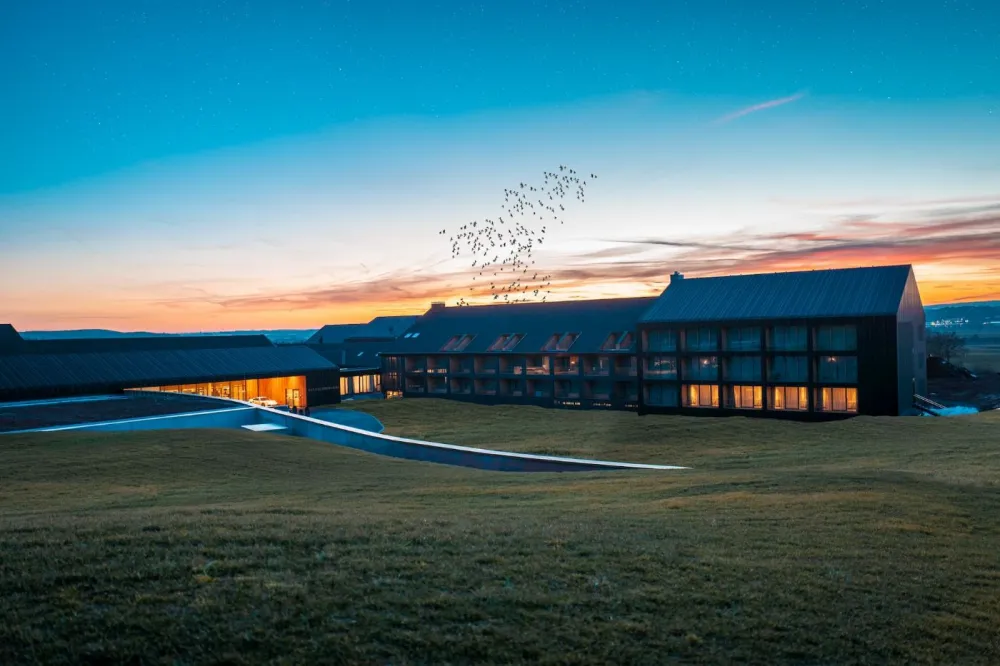 HOTEL DER ÖSCHBERGHOF
HOTEL DER ÖSCHBERGHOFResort hotel with spa and three golf courses, with a developing programme of sustainability management. It offers equitable employment through the Fair Jobs Hotels initiative. Since 2017 it has held the gold seal of DGV for ‘golf & nature’ covering conservation, golf course maintenance, safety and public relations.
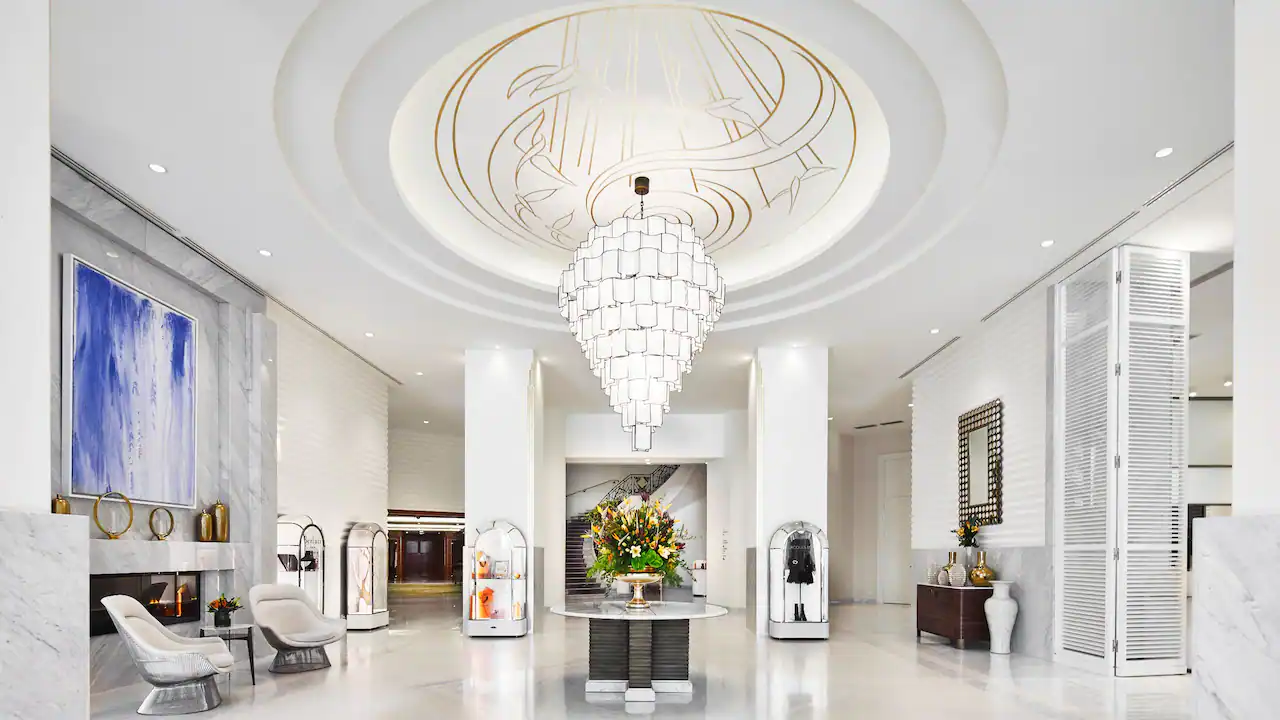 HOTEL MARTINEZ
HOTEL MARTINEZLuxury 5-star hotel with a sustainable tourism programme. An extensive waste reduction strategy includes donating food waste through a French charity that distributes meals to homeless people in Cannes. The hotel also supports two local groups working on biodiversity conservation in the Mediterranean.
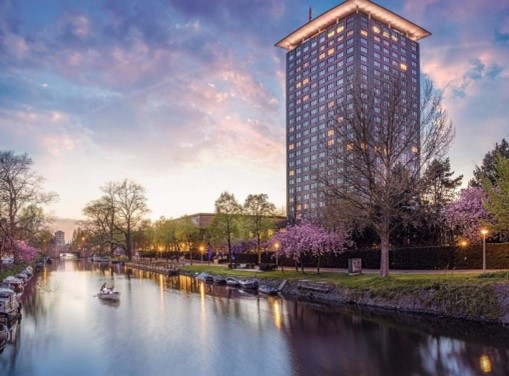 HOTEL OKURA *
HOTEL OKURA *Hotel Okura is a 300 bedroom high-end city hotel in Amsterdam. It actively promotes its Green Globe gold level certification. Its comprehensive Sustainability Management Policy is available via its website and provides details of environmental and social management action and projects. Staff are required to follow a Green Globe sustainability training programme and are encouraged to make practical suggestions. The CSR policy supports various charitable activities, notably in the area of child health and wellbeing.
Energy conservation is a main focus of activity. The installation of 873 solar panels on the roof of the Grand Ballroom led to a saving in the first year of 89 tonnes of CO2, equivalent to the planting of 2700 trees. Further CO2 minimization is achieved through a heat-cold storage system and not relying on gas. New ventilation technologies have been installed. Three chiller plants were replaced by one central generator using high efficiency cooling machines connected to canal water and a heat pump. A new Guest Room Management System automatically adjusts settings according to use. Eco-friendly transport is supported and suppliers and couriers as well as guests are encouraged to use bicycles.
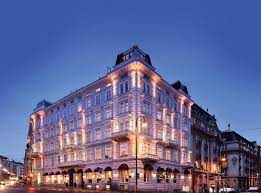 HOTEL SANS SOUCI WIEN
HOTEL SANS SOUCI WIENHotel following environmental management systems. Guests’ preferences for room servicing are conveyed through placing a special wooden cube on the bed. A Building Management System controls temperature.
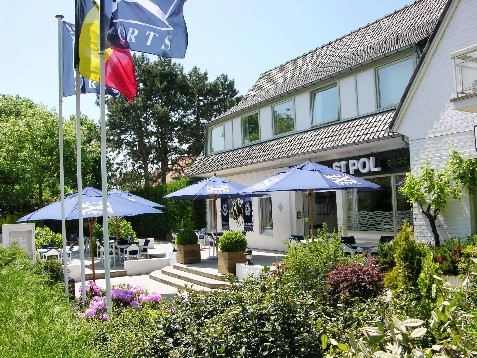 HOTEL ST POL *
HOTEL ST POL *The St Pol is a small, 18 bedroom family hotel in the seaside town of Knokke. It has a sustainability policy integrating people, planet and profit. The hotel has been seeking to control its environmental impact and limit environmental risks. In order to apply its policy consistently and throughout the organization, Hotel St Pol decided to implement the required measures in the context of Green Key certification, which it received in 2020. It actively involves its employees in implementing the sustainability policy and procedures and they receive relevant training. The hotel also engages with the environmental department of the City of Knokke-Heist regarding subsidies and support relating to its sustainability policies, activities and expansion.
Energy and water consumption are monitored to pursue continuous improvement. Electricity is partly sourced from their own 62 solar panels. Environmental management systems minimise pollution of air, water and soil, and waste is sorted and managed. Local and fair-trade produce is used in the restaurant, including the use of bread, cheese, jam and honey from local organic farmers. Charging points are provided for cars and bicycles.
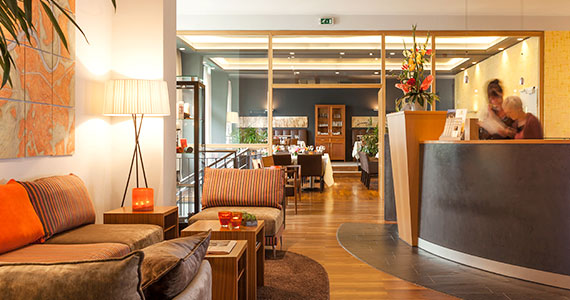 HOTEL VILLA ORANGE
HOTEL VILLA ORANGECity hotel in a green area of Frankfurt following eco-management principles. The hotel offsets all its emissions, through purchasing certificates which support a cooking stove project in Kenya.
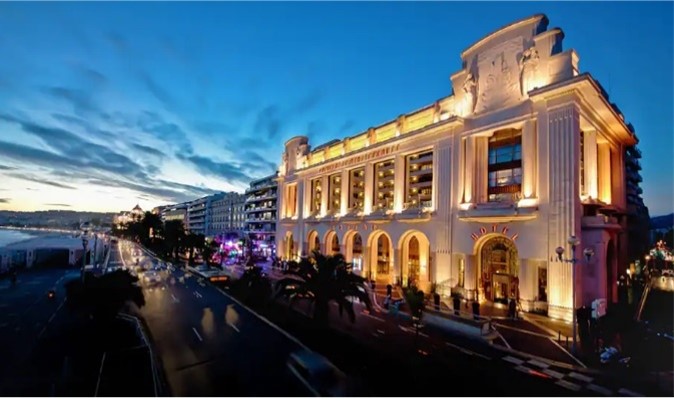 HYATT REGENCY HOTEL NICE *
HYATT REGENCY HOTEL NICE *Since launching its first environmental strategy in 2008, Hyatt has collaborated with hotel owners and operators to design and operate more efficient, lower impact hotels. The company states its commitment to continuing to advance meaningful actions to address climate change, water risks, and waste.
The Hyatt Regency in Nice is a traditional luxury hotel on the seafront. It has pursued various initiatives to improve the efficiency and sustainability of its operations, partly influenced by the COVID-19 pandemic. A new type of room cleaning service has been introduced, using a dry steam machine together with related training for full time and temporary staff. This process is ideal for maintaining hygienic surfaces on all types of materials, including marble, wood, glass, carpet, fabric and plastic. It thereby creates a safer environment for guests and staff. The hotel has 14 recycling streams in operation. In particular, the collection of hygiene and care products by Clean the World gives a second life to unused soaps and shower gels, while also helping people in need. A major initiative to increase energy efficiency is an ongoing programme to replace its 20-year-old boilers.
The hotel has been working on the way it calculates and collates carbon footprint data that is based on room nights and occupancy levels. For this it uses software tools provided by its parent company to produce room-night carbon footprint figures, set up future targets and track progress.
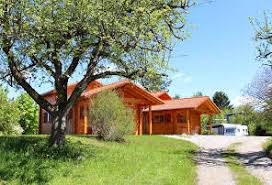 HÖHENCAMPING KÖNIGSKANZEL
HÖHENCAMPING KÖNIGSKANZELThe campsite opened in 2002 and has been climate friendly since 2014, with EU Ecolabel since 2020. Solar and woodchip heating. Preservation of biodiversity including bird-boxes, wildflower meadows, old fruit trees and planting programme.
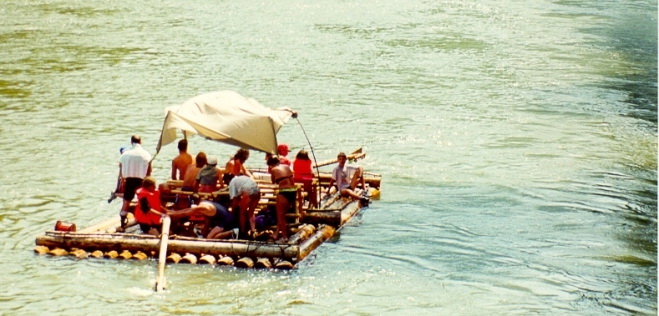 INTER PARES
INTER PARESA small trekking tour operator using non-motorised transport and staying in mountain huts, carefully removing all their waste.
 JESOLO INTERNATIONAL CAMPING CLUB
JESOLO INTERNATIONAL CAMPING CLUBLarge campsite with a variety of services, yet operated as carbon neutral. By implementing a general turn-round, it reduced its carbon footprint from 480 tons in 2008 to 40 tons in 2009, and further since then.
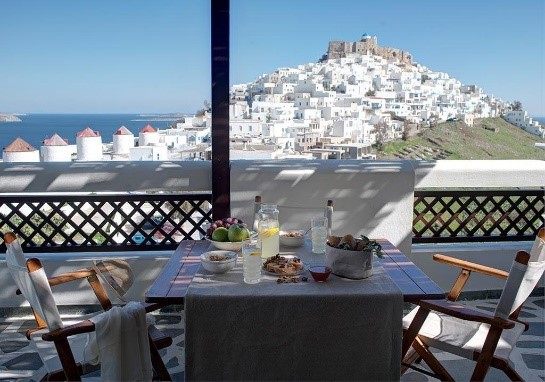 KALLICHORON ART BOUTIQUE HOTEL *
KALLICHORON ART BOUTIQUE HOTEL *Sustainability is one of the core values of this high quality hotel, which offers rooms and apartments. Energy and water saving practices and systems are followed, including the use of solar panels for water heating and a reverse osmosis water cleaning system in the kitchen. Guests are offered greener options for food and services. The website promotes the use of a carbon calculator and offset scheme, in partnership with Wayaj Sustainable Travel.
 KAMP KOREN
KAMP KORENThe business is EU Ecolabel certified, monitors resource consumption and carbon footprint, uses renewable energy and manages wastewater. The owner has a strong involvement with Green Slovenia and its actions for sustainable tourism.
 KASTEELHOEVE WANGE
KASTEELHOEVE WANGEHotel on a rural estate, with a strong focus on local sustainable food production and land management for biodiversity. Many partnerships have been formed with local producers and community bodies.
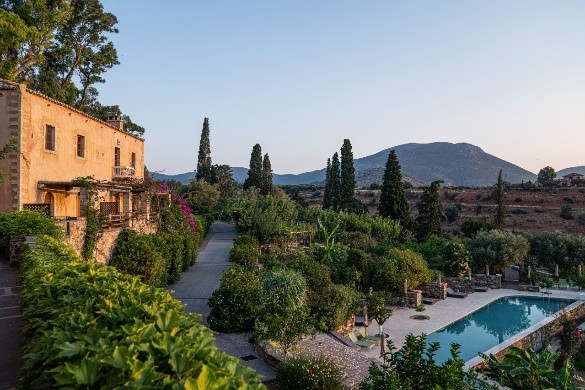 KINSTERNA HOTEL *
KINSTERNA HOTEL *The Kinsterna hotel is based in a restored manor house close to the popular cultural and coastal destination of Monemvasia. On its website the hotel links together its history, overall philosophy and approach to sustainability. Certification by Green Key is one part of this. Much emphasis is placed on the heritage of the building and site, with careful restoration using local and natural building materials: slate, cypress wood, pebbles, marble, old hand-made tiles, ceramics and reeds from nearby wetlands. The gardens have native plants and herbs and the swimming pools are filled with fresh running water from the cistern.
Local traditions have been carried forward in the operation of the hotel. These include harvesting grapes and making wine and tsipouro brandy, gathering olives and producing olive oil, weaving fabrics and making soap. Many craftspeople from the surrounding area have been involved. Over 90% of all employees are from the local area.
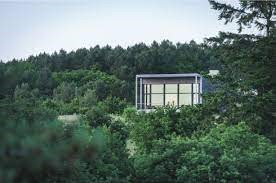 LA GRÉE DES LANDES *
LA GRÉE DES LANDES *La Grée des Landes is a hotel and spa in a natural setting near to the coast of Brittany. It identifies itself as an eco-hotel which lives with respect to nature, offering biodiversity, art, welcome and relaxation. The building has been designed to high environmental standards. It is south-west facing to make the most of sunlight. Green roofs and hemp-wool in the walls provide natural insultation. The rooftops contain solar panels and boilers use renewable wood from sustainably managed local forests. Water is carefully managed and recycled from the spa and swimming pool for use in toilets and for irrigating the gardens. Low flow showerheads halve the level of water consumption.
The French Birds Protection League (LPO) has been monitoring the hotel grounds since its creation and regularly takes a census of all fauna and flora. This informs the hotel’s management plan, which has had a very positive impact on native flora and fauna, with increases observed in the number and variety of birds, animals and insects. La Grée des Landes has invited students from other hotels to learn about eco design and management and the use of locally grown organic produce in the restaurant.
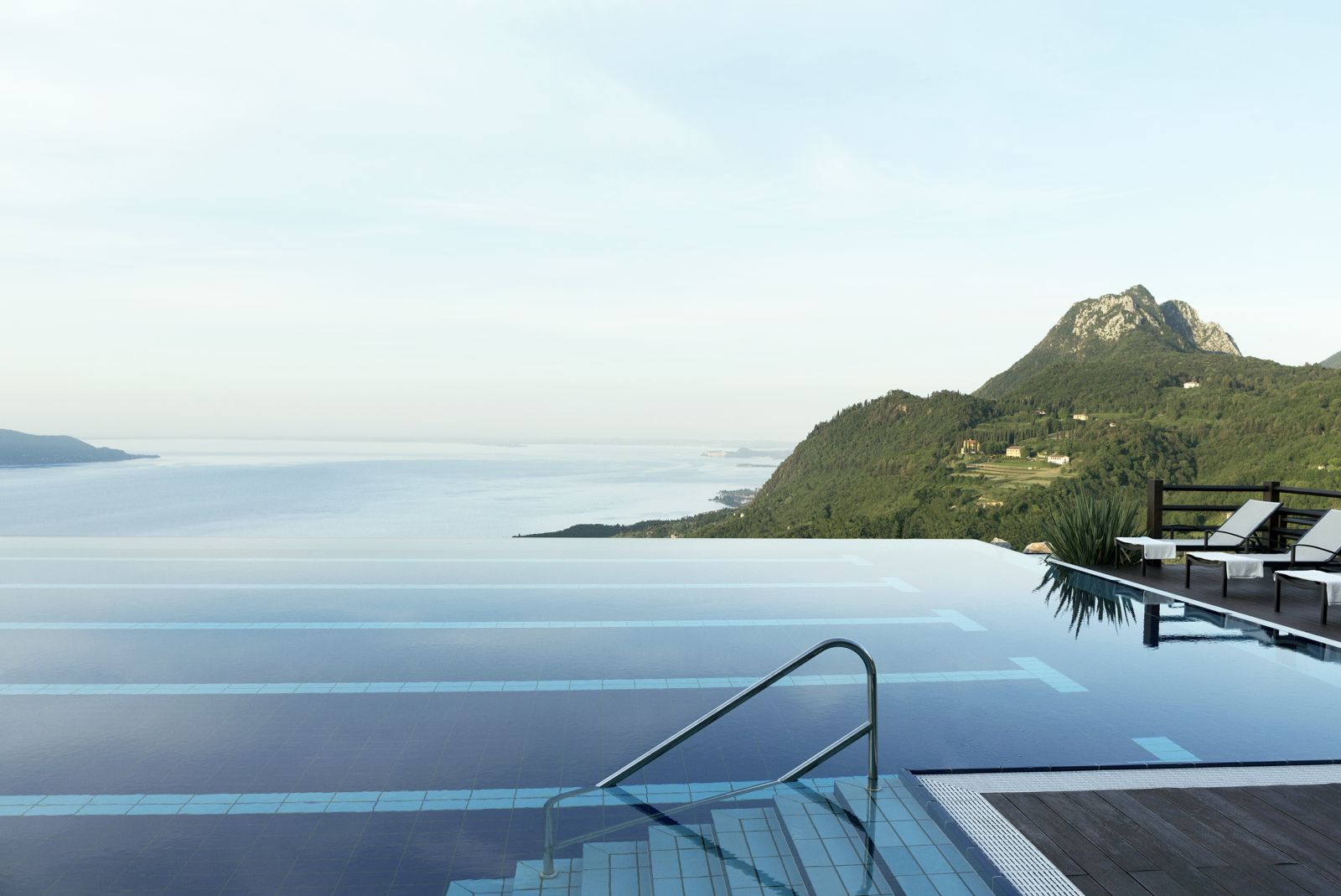 LEFAY RESORT AND SPA LAGO DI GARDA
LEFAY RESORT AND SPA LAGO DI GARDAThe resort company has an agreement with the Ministry of Environment in Italy for the calculation and reduction of GHG emissions. Technology used includes a biomass plant (covering 50 – 70% of demand), a micro-turbine co-generation plant and an absorption cooling system.
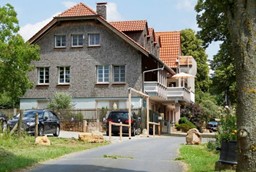 LINDEN-GUT HOTEL *
LINDEN-GUT HOTEL *The LindenGut is a small 20-bed hotel in central Germany. The hotel links its offer to its rural location in the Rhön, referring to “untouched nature, extensive hiking trails and certified organic quality food from our own farm”. Considerable emphasis is placed on enjoying a sustainable lifestyle while staying at the hotel. They affirm this by reference to their certification and inspection by Bio Hotels. They also make much of the biodynamic principles behind their own farming processes and food offer, which has a Demeter certification. Some guests come for green meetings or wellness programmes, with a specialism in fasting.
LindenGut uses the EMAS system for sustainable management. They use 100% green electricity, with highly efficient appliances and technology for minimising energy use, including permanent temperature control. There are no mini-bars or TVs in the rooms. CO2 equivalents per night is calculated at 11.81 kg. Guest bikes, e-bikes and shuttle services are provided. Water use is carefully managed and wastewater is disposed through their own constructed wetland. There is a detailed system of solid waste separation and avoidance of food waste. Staff are closely involved in the environmental management, with specific training and seminars, alongside an overall policy for the career development of young people. LindenGut has formed many partnerships with other businesses, especially in the field of organic agriculture and services.
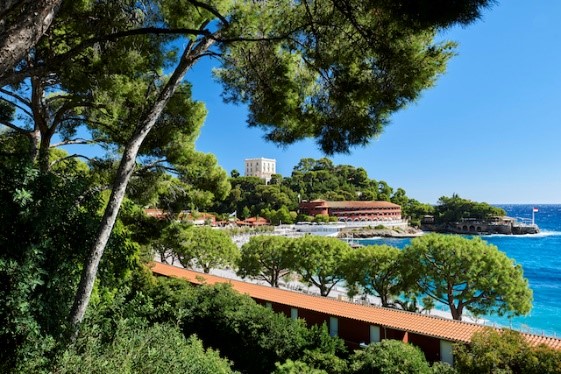 MONTE CARLO BEACH *
MONTE CARLO BEACH *Monte Carlo Beach is one a number of hotels and tourism facilities within the business group Monte Carlo Société des Bain de Mer. The Group has a strong commitment to sustainability, promoting the concept of “An increasingly green luxury” which is delivered through its Sustainable Development Charter 2019-22. Monte Carlo Beach and other hotels in the group have been certified by Green Globe, which is important in defining, projecting and affirming their approach. Areas of focus include energy saving, emissions and waste management. The hotel’s Elsa Restaurant is highly rated for cuisine, but the food is also fully organic.
A specific project of the hotel is the creation of a biodiverse reef dyke 100 metres from the shore, which is designed to protect the beach and allow the development of marine life within a protected area. The new space, similar to a lagoon, is suitable for swimmers who are encouraged to act responsibly and protect marine life and habitats. The hotel also has its own natural forest at Pointe de la Vigie, for which it has now achieved designation for bird protection by the national conservation body LPO. It is becoming an essential refuge for local biodiversity. The hotel also has a strong community engagement, including educating local children on ecology and supporting charitable work with homeless people.
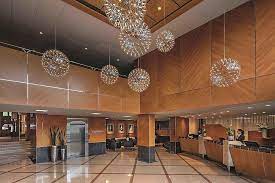 MÖVENPICK HOTEL ZÜRICH REGENSDORF
MÖVENPICK HOTEL ZÜRICH REGENSDORFThe hotel achieved a 90% reduction in waste by focusing on packaging, including replacing certain bottled drinks with local mineral water. It participates in campaigns to distribute unused food, through ‘Too Good To Go’ and work with local church and other bodies, plus support for local children’s charities.
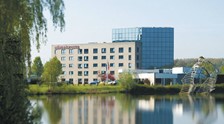 MÖVENPICK HOTEL‘S-HERTOGENBOSCH *
MÖVENPICK HOTEL‘S-HERTOGENBOSCH *The Mövenpick Hotel is located at the waterfront of Lake Provinciehuis just outside the historical city centre of den Bosch. The 4-star hotel was recently renovated and provides a base for business travellers and leisure guests. The hotel is certified by Green Globe and follows systems for energy, water and waste management. Guests are encouraged to hire bikes to explore the many cycling routes in the area.
The Mövenpick ‘S-Hertogenbosch is involved with various social sustainability initiatives with its employees and wider community. Training is provided for local communities to develop a qualified local labour force. Disadvantaged young people are given the chance to explore different professions within the hotel, such as working in the kitchen, as a waiter and in reception. Secondary school pupils and students are welcomed to do hospitality work experience. Through the Kilo of Kindness campaign, Mövenpick Hotels provides clothes and toys to underprivileged children and support to the Voedselbank (foodbank) in ‘S-Hertogenbosch. The hotel supports WWF and the Natuurmonumenten programme in the management of nature reserves and wildlife. Through the Litre for a Litre project, water saved by the hotel is measured and an equal amount is donated to people in developing countries, amounting to 90m litres in the last five years.
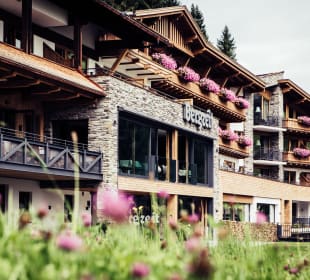 NATUR & BIOHOTEL BERGZEIT
NATUR & BIOHOTEL BERGZEITThe hotel opened in 2016, following Biohotels certification from that time. This involves mandatory CO2 measurement, 100% green electricity, waste management and use of organic, local and natural products.
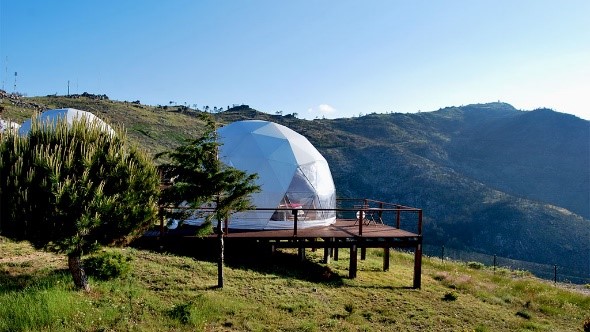 NATURA GLAMPING *
NATURA GLAMPING *Natura Glamping provides seven luxury glamping pods in the form of geodesic domes, together with a restaurant. The enterprise offers various activities, such as yoga classes, horse riding, cycling, swimming pool/jacuzzi, various types of massage, hiking and photographic tours along the 130 km of walking paths spread throughout the Serra da Gardunha. The enterprise stresses its concern for nature and sustainability. It has adopted a Responsible Tourism Policy which is introduced on its website, which also refers to its certification by Biosphere.
Key areas of action include the reduction and separation of waste, measurement of carbon footprint, prioritisation of fresh products with limited packaging, use of local and environmentally sensitive suppliers, and the elimination of plastic. Green areas have been created between the domes, partly to reduce the effects of heat islands on the site and also to promote biodiversity. Native species are used and exotic and invasive species are controlled. Guests and employees are provided with information about the management of natural resources.
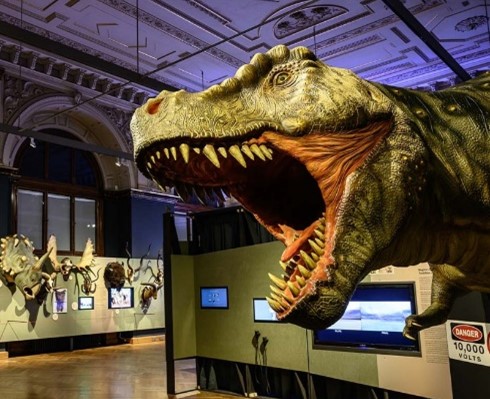 NATURAL HISTORY MUSEUM VIENNA *
NATURAL HISTORY MUSEUM VIENNA *The Natural History Museum Vienna is among the largest of its kind and one of the most important museums in Europe. The stated aim of the museum is: “To make a significant contribution to sustainable development in Austria, Europe and the world. This is to be achieved through excellent disciplinary, interdisciplinary and participatory research, through the digital opening of the extensive collections, through innovative, inclusive and inspiring approaches to science communication and through the implementation of a CO2-neutral museum by 2030.” This means that its sustainability action includes both the outreach and messaging from its contents and programmes and the management of its own operation as a visitor attraction.
The museum is working to reduce its energy consumption and emissions through the expansion of photovoltaic systems. It operates a sustainable purchasing policy. Materials and equipment are recycled where possible. The multiple use of exhibitions and related props is pursued. Decommissioned hardware is passed on for re-use in social projects.
Some of the contents have a particular relevance to promoting sustainable consumption and climate action. An example is the exhibition “Expiry Date: When food turns into garbage”. Increasing space is being given to science education, notably the Deck 50 area, which is used for interactive exhibits, educational events and workshops.
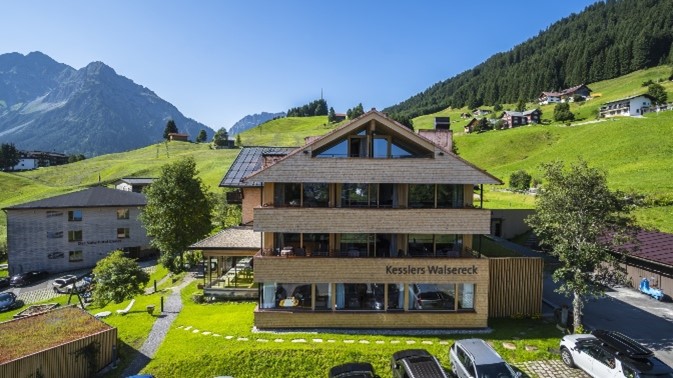 NATURHOTEL CHESA VALISA *
NATURHOTEL CHESA VALISA *The approach followed and projected by the Chesa Valisa is of a hotel which maintains a close relationship with the nature of the surrounding valleys. The original building dates from 1507 and the owners have sought to maintain the historic tradition and mix it with modern inspiration. The use of natural building materials, such as wood and rammed earth walls, creates a healthy indoor climate. Other natural elements incorporated in the experience are water, through a steam and small waterfall, and fire, provided in a rammed clay fireplace.
The hotel uses 100% green electricity and concentrates on sourcing organic and local supplies. An emphasis is placed on the wellbeing and sustainable living of employees, through the accommodation, catering, equipment, leisure facilities and special benefits provided for them. The hotel has also influenced activities in the community, persuading various farmers in Kleinwalsertal to switch to organic production.
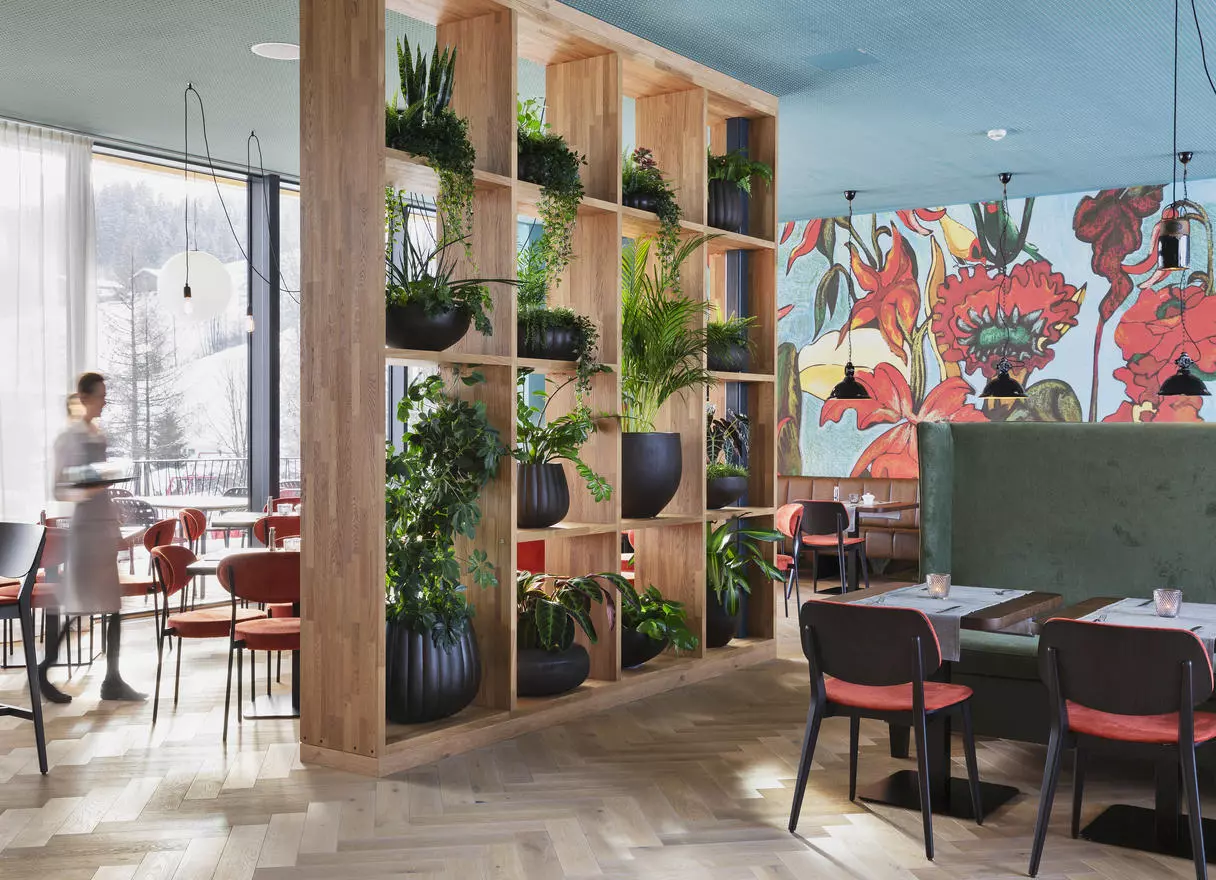 NATÜRLICH HELL
NATÜRLICH HELLCampsite and apartments focusing on energy, using solar, wood pellets, logs from their site, heat recovery, and control systems, together with water and waste management. A low-energy sanitary building has a natural green roof. Membership of Ecocamping enables comparison of sustainability with other campsites.
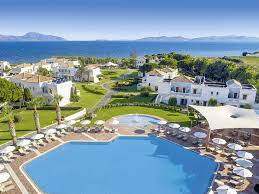 NEPTUNE HOTELS
NEPTUNE HOTELSSizeable resort with a sustainability commitment related to Travelife certification. Measured success in raising the proportion of locally sourced food and reducing the level of meat consumption, with guests actively involved in cooking classes and wine tasting.
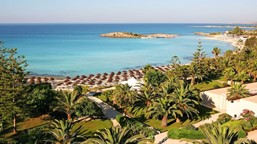 NISSI BEACH RESORT *
NISSI BEACH RESORT *Nissi Beach Resort is a sizeable resort complex providing hotel accommodation and a wide range of leisure services. The resort strives to achieve a low environmental impact from its operations. Its sustainability policy and report is available on its website, alongside its certification by Travelife. This identifies action taken in a wide range of areas, including energy saving, water use, waste management, local purchasing and reduction in the use of plastics. It also sets out quantified results from monitoring. All employees receive training on sustainability issues and guests are kept informed about actions taken.
A special initiative has been the rejuvenation of the Nissi Beach shoreline. The sand dunes were covered in an invasive plant species that suppressed biodiversity. Hotel staff set about removing these plants and replacing them with species that are endemic to the area, which also protects the dunes from erosion. Native plants growing wild on the site have also been monitored and protected. The results have been highly successful. Signs have been erected to inform guests about the plants and the importance of protecting the dunes. The resort has also involved staff, guests and local people in other conservation and management activity, including beach cleans.
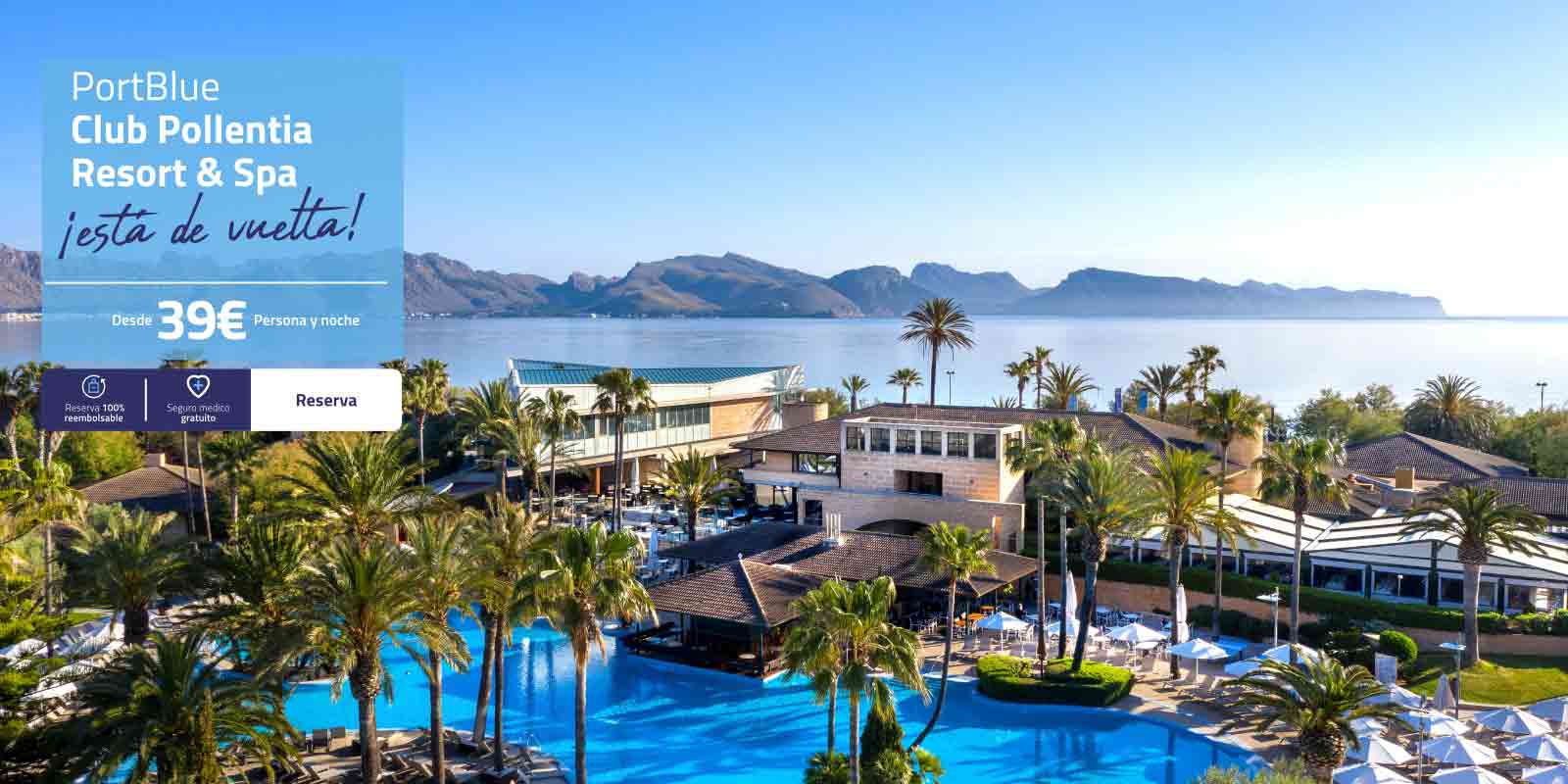 PORTBLUE CLUB POLLENTIA
PORTBLUE CLUB POLLENTIAThe resort has an agreement with the s'Albufereta Nature Reserve, providing an interpretation centre, signposting and opportunity for guests to donate to conservation, which is matched by the resort. They have also taken action to eradicate invasive plant species.
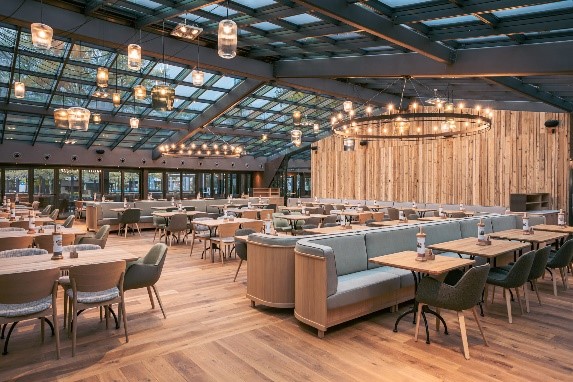 RESTAURANT LUFTBURG *
RESTAURANT LUFTBURG *The Luftburg identifies itself as the largest fully certified organic restaurant in the world. It is located in the green Prater area of Vienna and carefully manages its site for biodiversity. Energy is partly provided by photovoltaic systems and ventilation and refrigeration uses heat recovery, with a future switch to 100% renewable energy. Waste separation, recycling and minimal use of water are all important to them, supported by regular staff training in these matters.
A considerable effort is made by the team, together with their suppliers, to ensure that 100% of the food is certified organic. A local farmhouse beer from organic malting barley is used exclusively in the restaurant. Any leftover cooking oil is converted to biodiesel. Guests are encouraged to take away uneaten food in biodegradable containers.
There is an active policy towards diversity. For years they have employed recognised asylum seekers who learn German with them and are helped to integrate into the local society. They have also created jobs for people with specific disabilities, supported by personal mentors.
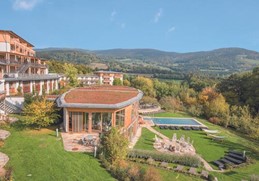 RETTER BIO-NATUR-RESORT **
RETTER BIO-NATUR-RESORT **The Retter Resort is a 116 bedroom hotel, seminar centre and wellness facility in rural Austria. The business was established and is run by the Retter family. It places a major emphasis on its relationship with nature, linking this to the whole ethos of the business operation and to the guest experience, of which its location within the Pöllauer Tal Nature Park is a key aspect. This relationship pervades the communication on the website and the positioning of the Retter brand.
The Retter Resort has achieved very high scores in its certification by both the Austrian Ecolabel and by Green Globe. It has been officially certified as a Carbon Neutral Hotel. The low temperature and biomass heating system, using wood chips and an optimised energy concept with ceiling air conditioning, has helped to cut emissions by 1m Kg per year. All doors and windows are equipped with sensors which prevent unnecessary cooling or heating. All seminar rooms have CO2 sensors and guarantee a constant supply of fresh air. Further action to reduce net emissions includes the promotion of alternative transport options for guests and staff and the installation of 10 charging stations for electric vehicles.
A goal has been set only to use food that is organically certified and from the local region. The Retter BioGut is a shop next to the hotel selling organic bread and pastries made from regionally sourced flour and baked daily in a wood oven. All meat used is from organic husbandry. Since 2014 Retter has been collaborating with Labonca Pasture Abattoir, involving a private pasture of 100 pigs, stress-free slaughtering and the production of ham and sausages using phosphate-free and nitrite-free hot-frying processes. A newly planted orchard is managed for biodiversity and the grazing of sheep and chickens. Sparkling water is sourced directly from a local spring. Rainwater is used not only in the gardens but also to flush the toilets, thereby saving 3m litres of water each year.
The company has an employee profit-sharing system for sustainable management, with bonuses paid annually. The motivation of employees is promoted through the joint development, achievement and celebration of corporate sustainability goals. Lasting partnerships are also established with the trainers and companies who use the Retter’s extensive and award-winning seminar facilities and who value the venue as a showcase for service, quality and sustainability. The latest seminar technology is employed, including the use of Weframe to enable hybrid meetings to reflect the new market reality.
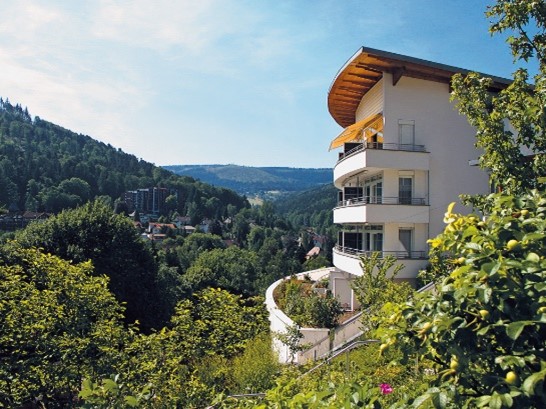 SCHWARZWALD PANORAMA *
SCHWARZWALD PANORAMA *Schwarzwald Panorama is a hotel providing spa and wellness facilities and rooms for meetings, in a building with extensive views over the landscape of the northern Black Forest. It is promoted as an eco-hotel and has a strong philosophy of supporting a sustainable living and working environment, in partnership with its guests, employees, suppliers and local community, with its own operations certified by Green Sign.
An annual sustainability report outlines various actions on responsible consumption and production, including: waste separation (20 types); organic and biodegradable products; zero-waste buffet breakfast; photo-booth for use instead of postcards; no air-con in rooms; use of electric vehicle; e-charging station and bike rentals. Energy is audited and the carbon footprint is measured – it was reduced from 47kg to 22.5kg between 2018 and 2019. The garden is managed for biodiversity and goats have replaced the lawnmower. Various measures are taken to involve the staff and to support local initiatives. Green meetings are obligatory and the companies concerned get a certificate for their CSR-report.
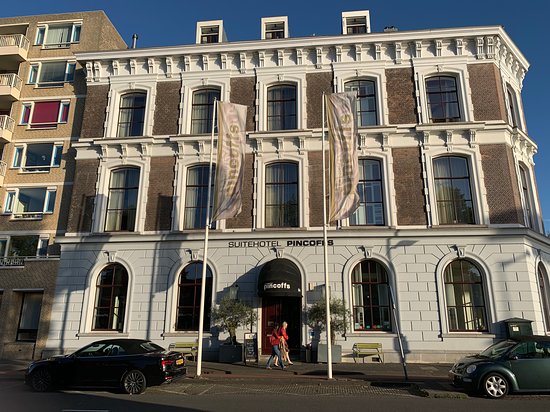 SUITE HOTEL PINCOFFS
SUITE HOTEL PINCOFFSThe hotel has been measuring energy, water and waste for 10 years. It uses organic, local and Fair-Trade products. E-bikes and e-charge stations are provided and the hotel has created a small urban garden on the quay in Rotterdam.
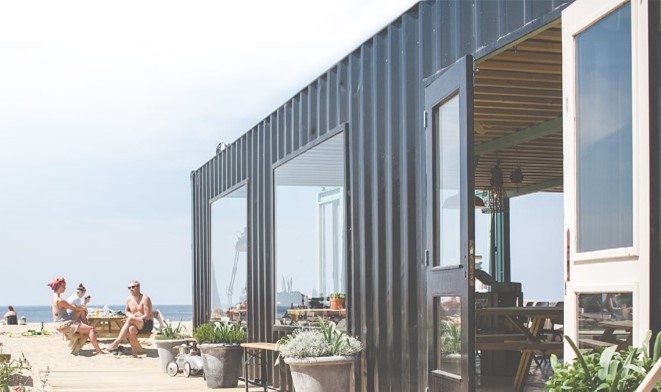 THE SHORE SCHEVENINGEN *
THE SHORE SCHEVENINGEN *The Shore is a surf school, skate park and café, with arts and music events, in the seaside town of Scheveningen. Their website evocatively sets out their sustainability principle “to allow future generations to enjoy the beach, the waves and our world” recognising that as a surf school they “do business with, and thanks to, the elements”.
The building and interior is made out of used products, including redesigned shipping containers which leave no footprint. The 7.5KW solar installation on the roof produces three quarters of their energy, enabling them to achieve a consumption of 11,000 kwh/year (compared with 80,000 for an average beach pavilion). Grey water is used to flush the toilets and surfers are encouraged to take only short showers. The menu is fully organic and where possible bio-dynamic – 95% vegetarian with mostly vegan options. They adopt a waste-free policy towards suppliers. Wetsuits are repaired not replaced, as they are a petroleum-based product which can’t be downcycled.
Since 2007 they have organised beach clean-ups, including “Clean-up Kids”, a beach clean-up tour, and partnership in a Clean Beach Cup. Visitors can trade a full bag of trash for a cup of coffee or ice-cream. They persuaded three other neighbouring restaurants to tender with them for a joint waste collection service, reducing 16 waste transport movements per day to just four. In 2018 they initiated the “Plastic Free Terrace” campaign bringing together beach café owners (now 40 of them) to abandon single use plastics.
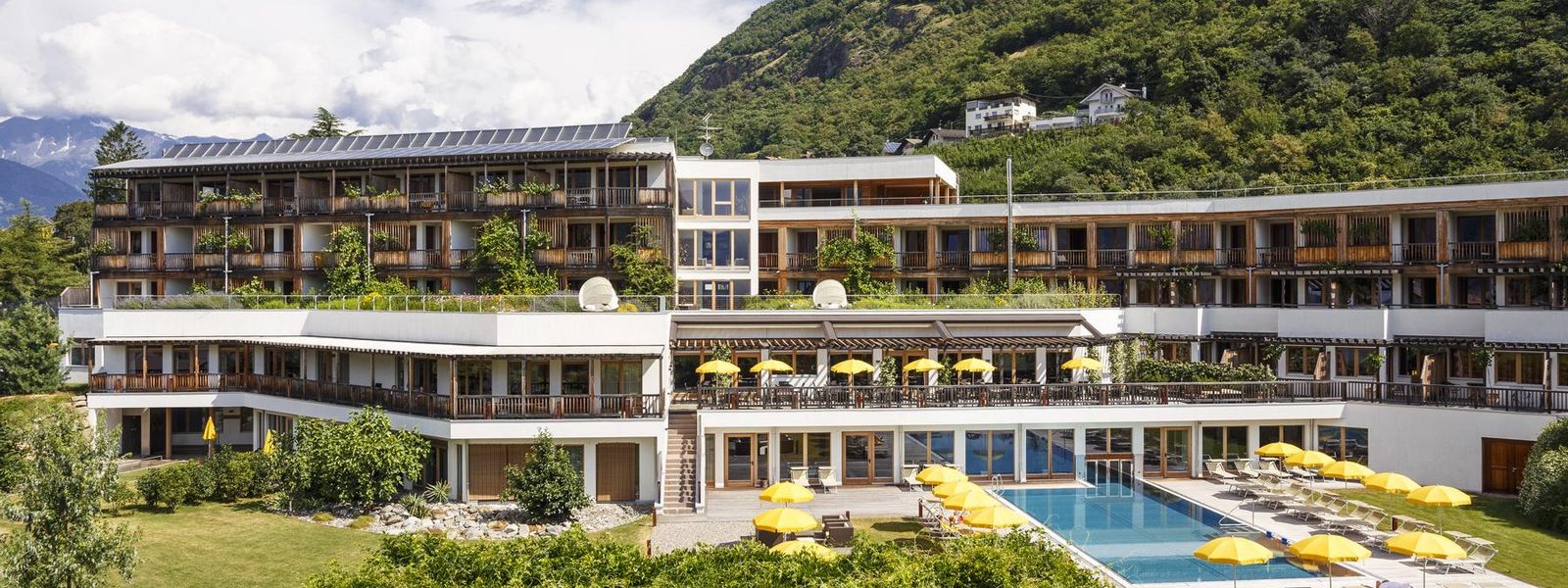 THEINER'S GARTEN
THEINER'S GARTENA bio-refuge hotel which strongly promotes its sustainability principles and wellness offers in its marketing. The hotel focuses on energy efficiency, achieving 3.46 kg CO2 per night, and the rooms are electrosmog-reduced and soundproofed. Organic food is used, including growing their own fruit and herbs.
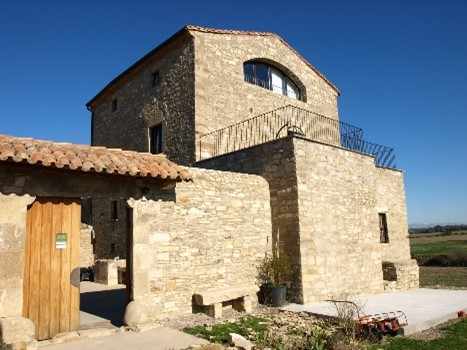 TORRE DEL CODINA *
TORRE DEL CODINA *The Torre del Codina is an individual rural property with accommodation for fifteen people in six bedrooms. It is in a restored and converted seventeenth century building. Ninety percent of the energy used is clean and renewable, provided from a combination of wind, thermal, photovoltaic and biomass sources. Rainwater is collected and used for irrigation and in a pond for fauna. It is also filtered for use as drinking water.
Guests are encouraged to explore the surrounding areas of natural and historic interest. The accommodation is located on an ecological farm. Wine tastings are held and the production process is explained. The farm is involved in the reforestation of a 12.5 hectare site. During the summer owls and kestrels are reintroduced into the natural environment. The accommodation business is an active partner in a local Leader Programme and is involved in a working group promoting ecotourism in the region.
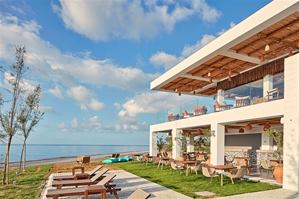 TUI SENSATORI ATLANTICA DREAMS
TUI SENSATORI ATLANTICA DREAMSAn energy efficient desalination process is used to treat seawater so that it produces clean water that can be used in the hotel. This minimises disruption of local fresh water supply and reduces emissions from water sourcing. Wastewater is treated onsite.
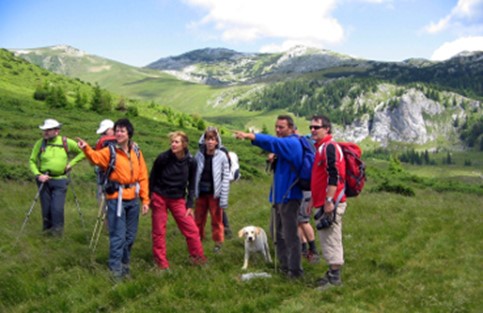 TYMES TOURS
TYMES TOURSTour operator focusing on Romania’s nature, history, cultural sites, traditions and people. For 7 of the 11 days programme no motorised transport is used. Accommodation includes a hut with its own mini hydro plant. The leader of the company works closely with conservation NGOs on supporting research projects.
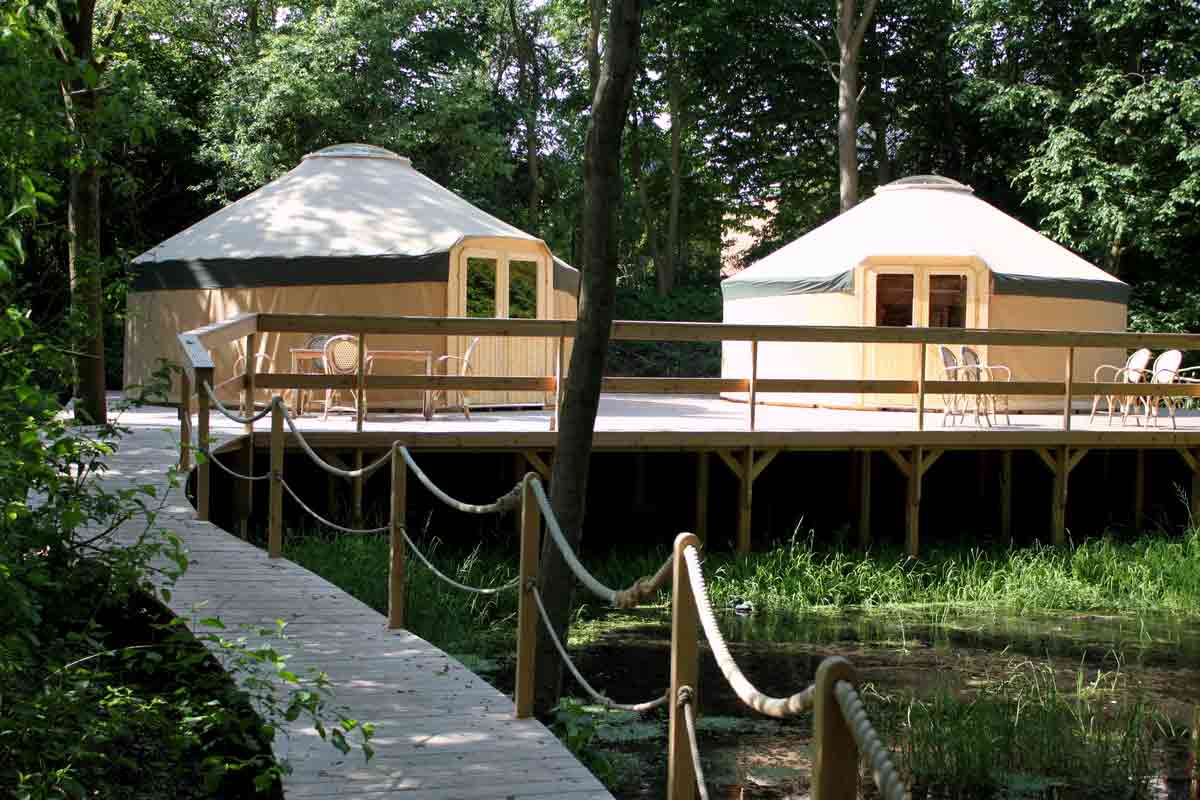 UHLENKÖPER CAMP
UHLENKÖPER CAMPThe campsite produces its own energy and serves and sells only bio-food from regional producers. A new reception and sanitary building in 2020 has followed sustainable standards, with regrowing building materials and consumption cutting technologies.
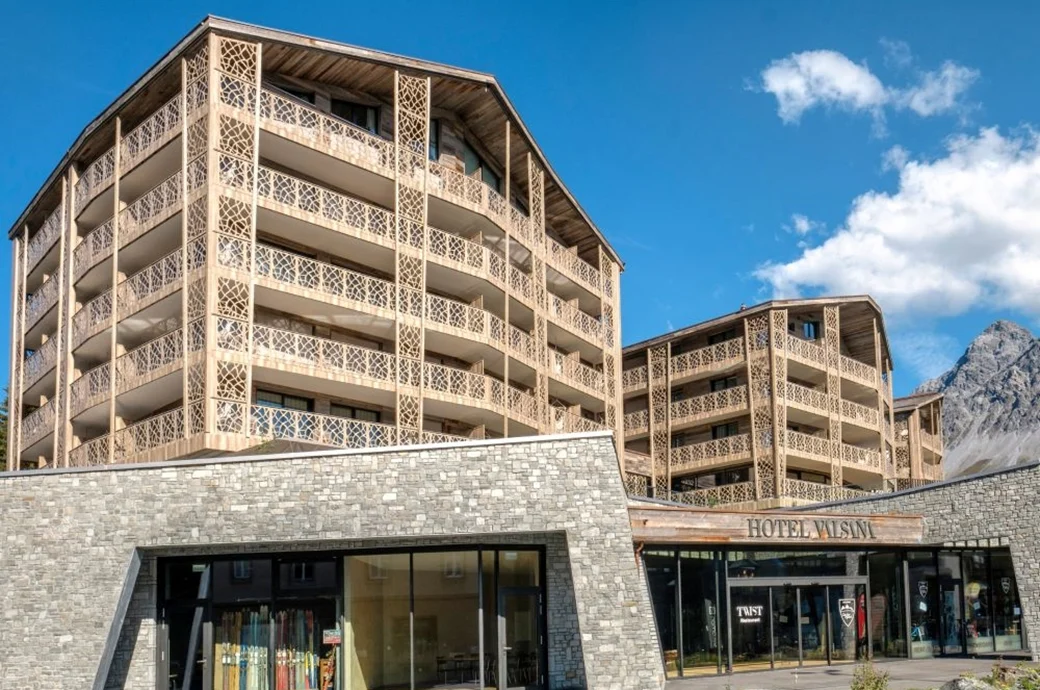 VALSANA HOTEL
VALSANA HOTELLarge hotel run on sustainability principles. All electricity is renewable. In colder periods this includes use of an ice battery with geothermal probes and a heat recovery process. Emissions compensation payments are used to support a nature reserve. Staff are active in recycling, including producing glass vases from old bottles.
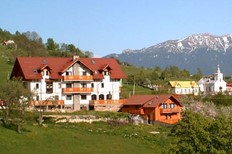 VILLA HERMANI **
VILLA HERMANI **Villa Hermani is a 17 bedroom guesthouse in Măgura mountain village, in the middle of the Piatra Craiului National Park. Livestock breeding is the basis of the local economy. In summer the animals graze in the alpine meadows cared for by shepherds and dogs as protection against wolves and bears, and the hay meadows in the village are still scythed. The guesthouse was opened in 2004 and initially certified by the Eco-tourism association AER in 2006. The guesthouse is operated by Carpathian Nature Tours (CNT), a tour operator specializing in soft adventure, nature/culture discovery and wildlife watching, with a high level of responsibility.
The guesthouse uses solar energy during the summer, which covers 90% of the requirement for water heating. All electrical equipment is low energy. Water consumption is reduced by special devices in each bathroom. Food is purchased locally as far as possible, with all the beef, mutton and lamb sourced from the village. Bulk purchasing of items such as sugar reduces the use of packaging. Guests who participate in the Nature Tours spend six out of seven days on trekking excursions with no use of motorised vehicles.
VCNT was founded in 1999 in cooperation with the Carpathian Large Carnivore Project as a sustainable tourism programme for the area of the National Park. Its main interest is the conservation of nature and the protection of the European large carnivores – bear, wolf and lynx. Bear watching generates substantial revenue for wildlife management units (around EURO 10k in 2019). The owner is also involved in a stork monitoring programme. CNT also works with the Romanian Institute for Wildlife Research on some of their projects, such as programmes for the reintroduction of beavers and marmots.
All staff come from the local village and local contractors are used for construction and maintenance. The guesthouse initiated a new ecotourism trend in the village and other local people have also opened accommodation. The guesthouse team initiates and supports various clean-up actions on the village, as well as other activities mobilising volunteering by local young people to meet common objectives.
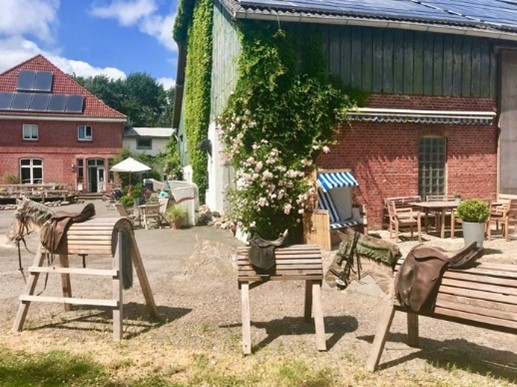 WARFTHOF WOLLATZ *
WARFTHOF WOLLATZ *The Warfthof Wollatz offers farmhouse rooms, rental cottages and camping on an arable and vegetable farm on the edge of the marshland and mudflats of Germany’s North Sea coast. A strong feature is made of the agricultural heritage and environment, which guests are able to experience passively and actively. The farm itself is certified as organic and is managed according to Bioland guidelines. Many areas and activities are focused on increasing biodiversity, including ponds, wildflower meadows and tree planting. The farm provides a child-friendly atmosphere, with natural contact with many animals.
Electricity is provided partly by 1200 square metres of photovoltaics and partly by turbines making the most of strong winds off the sea. Earlier wind turbines have been replaced by more modern technology, and the farm operates three Enercon E82s with their neighbours which generate enough power for over 6000 single family houses. Radiant wall heating and earth building technology enables them to work with low flow temperatures. One of the houses has a geothermal heat pump. Charging facilities are available for electric cars and e-bikes. Ecological products and toiletries are used in servicing the accommodation.
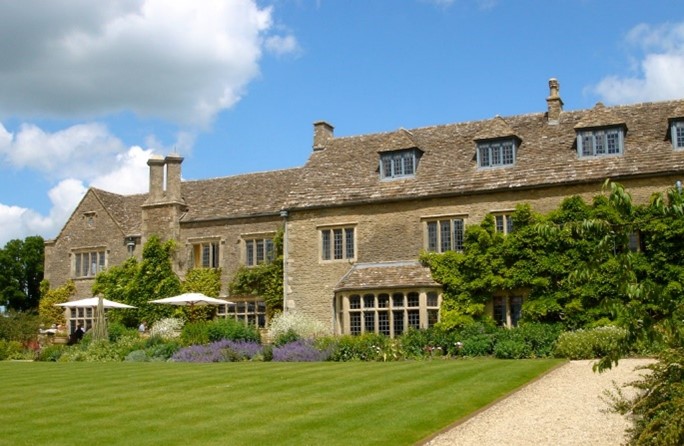 WHATLEY MANOR **
WHATLEY MANOR **Whatley Manor is a former C18th manor house in the heart of the historic Cotswolds landscape in the west of England. It is now a luxury 23 bedroom hotel and spa, offering a fine dining experience in its Michelin starred restaurant. Energy, water and waste have been measured since 2017 and in 2019 its owners embarked on a sustainability journey, with a commitment to Net-Zero emissions by 2028. Obtaining sustainability certification from Earthcheck, with additional awards and recognition for an eco-friendly spa and green gastronomy, has encouraged and supported them on this journey.
In 2019 the electricity supply was changed to 100% certified renewable energy. Emissions have reduced from 73kg CO2-e per guest night in 2019 to 43kg in 2020. Removing plastic and packaging from deliveries reduced the hotel’s bin requirements from 14 to 4 per week, saving GBP 7k per year. General waste has been reduced by 49%, with zero going to landfill. Rather, it is treated in an OCO Plant which captures all the carbon from the combustion process, with the residual waste of ash and lime made into carbon neutral building blocks – an example of the circular economy. Water-saving shower heads are estimated to lead to a saving of 4.5 tonnes of CO2 and 0.5m litres of water.
Biodiversity is encouraged in the five hectare garden. Actions have included the re-wilding of some areas, the introduction of four colonies of bees, enhanced composting including the use of wormeries, the introduction of little ladders to prevent hedgehogs from drowning in the ponds, and the planting of a new orchard. The hotel monitors the cleanliness of the River Avon, which runs through the grounds, taking measures to ensure that it is not polluted and removing litter and vegetation to aid its flow.
Whatley Manor has its own Equality Diversity and Inclusion Policy. Of the 109 staff, 13 are under the age of 18 and 67 are women (including 50% of the management team). Career development is assisted by a 12- month hospitality training and apprenticeship programme. Staff are encouraged to embrace sustainability: a cycle to work scheme is in place and staff journeys are measured and tracked.
A key aspect of their approach is to influence others. The hotel raises awareness of employees, guests and the local community by running trainings, information sessions and speaking at public events. In 2021 it held its first sustainability workshop for its ten main food suppliers, highlighting the need for data transparency and measurement and sharing best practice. Some contracts have been renegotiated in favour of local businesses committed to sustainability. The General Manager is also playing a leading role in promoting and advising on sustainability within the hospitality sector as a whole.
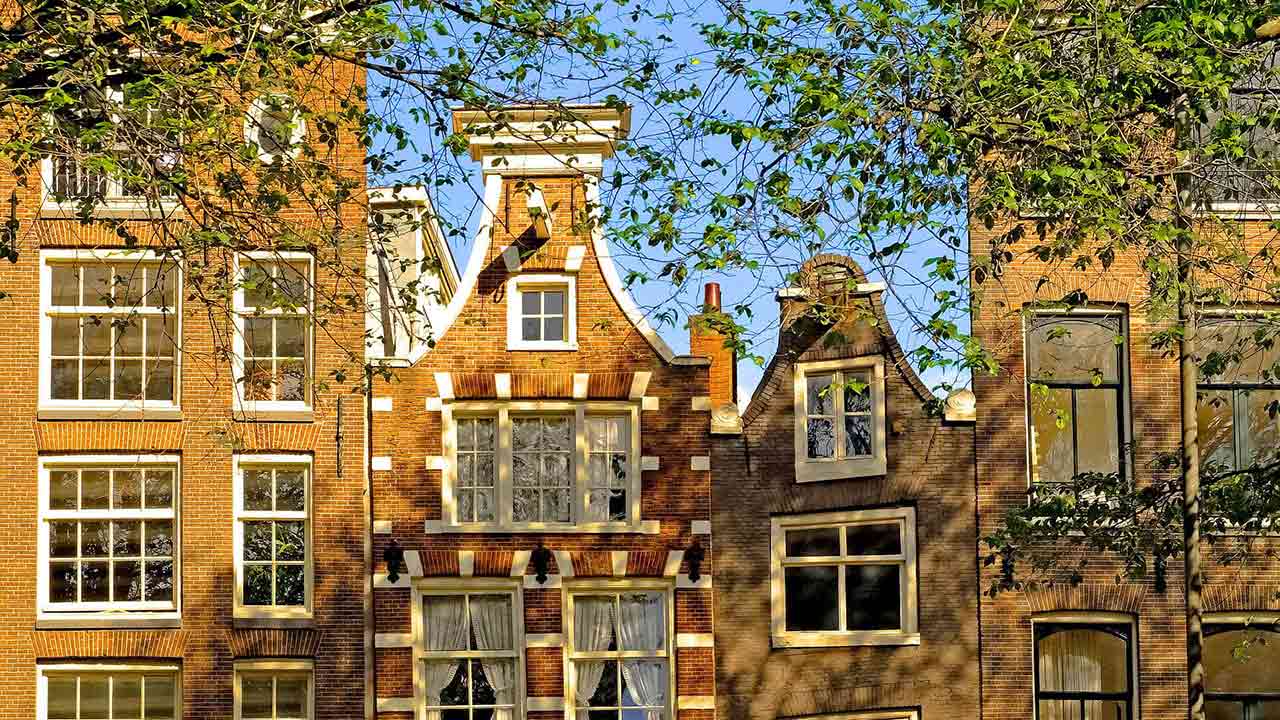 YAYS CONCIERGED BOUTIQUE APARTMENTS
YAYS CONCIERGED BOUTIQUE APARTMENTSVarious measures are taken to reduce energy and water use, as well as partnering with a company that converts different types of waste into renewable energy. The company and staff have supported and been directly engaged in various local charity initiatives in Amsterdam.
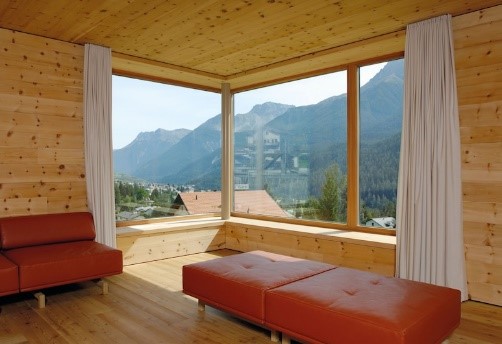 YOUTH HOSTEL SCUOL **
YOUTH HOSTEL SCUOL **The youth hostel in Scuol is one of over 50 individual hostels operated by Swiss Youth Hostels. It has 164 beds provided in a mixture of two to six bedded rooms. The hostel has pursued environmental principles in its initial construction and its operation. It has received the IBEX Fairstay sustainability label since 2010 and in its last certification it achieved the top rating of ‘Platinum’. The hostel has also received various awards for architecture and green technology.
The hostel was built according to the highest energy standards in Switzerland. The ECO building label confirmed that only the most environmentally friendly building materials were used, and the Minergie construction method ensures minimal energy consumption during operation. Energy use and CO2 emissions are reduced to a minimum, through the use of efficient appliances, a heat-pump system for heating and solar collectors for hot water. The 27m2 system saves about 15,000 kWh of energy per year. All electricity is sourced from renewable hydropower. The carbon footprint of the Scuol hostel is significantly less than the already low average for Swiss youth hostels of 5.5 kg per overnight stay.
Guests can offset their CO2 emissions with Myclimate and make a contribution to local sustainability. This is then doubled by Swiss Youth Hostels. The location of the Scuol hostel in the immediate vicinity of the train, bus and mountain railway stations is perfectly geared to travel by public transport. The hostel seeks to provide a healthy, low impact experience. Vegetarian and vegan dishes are offered and meat is anti-allergenic and sustainable. Exploration of the surrounding natural area is promoted and facilitated.
From the beginning, prior to development, there was close engagement with regional and local bodies, including the mountain railways, the municipality and tourism organisation. Exceptional cooperation was sought with the regional farmers’ association, which made the land of its former cattle market available for the building. In return, the hostel buys as much regional farm produce as possible and gives preference to hiring farmers, especially in the winter season when there is little work on the farm. Equal opportunities and pay are provided for men and women and there is a strong focus on barrier-free accessibility.
Swiss Youth Hostels has very strong links with local, regional and national organisations and seeks to set an example on sustainability in the tourism industry. In this regard, it also plays a leading role in Hostelling International, which has 63 youth hostel associations in 81 countries.